Saskatchewan anglican
Teaching sex ed to school boys
Bishop Michael Hawkins (middle, at podium), speaks to 250 boys aged 11 to 17 in Uganda to help them better understand women's menstruation, during a trip to the African country with the Diocese of Saskatchewan's Days for Girls team. For full story and pictures, see page 10.
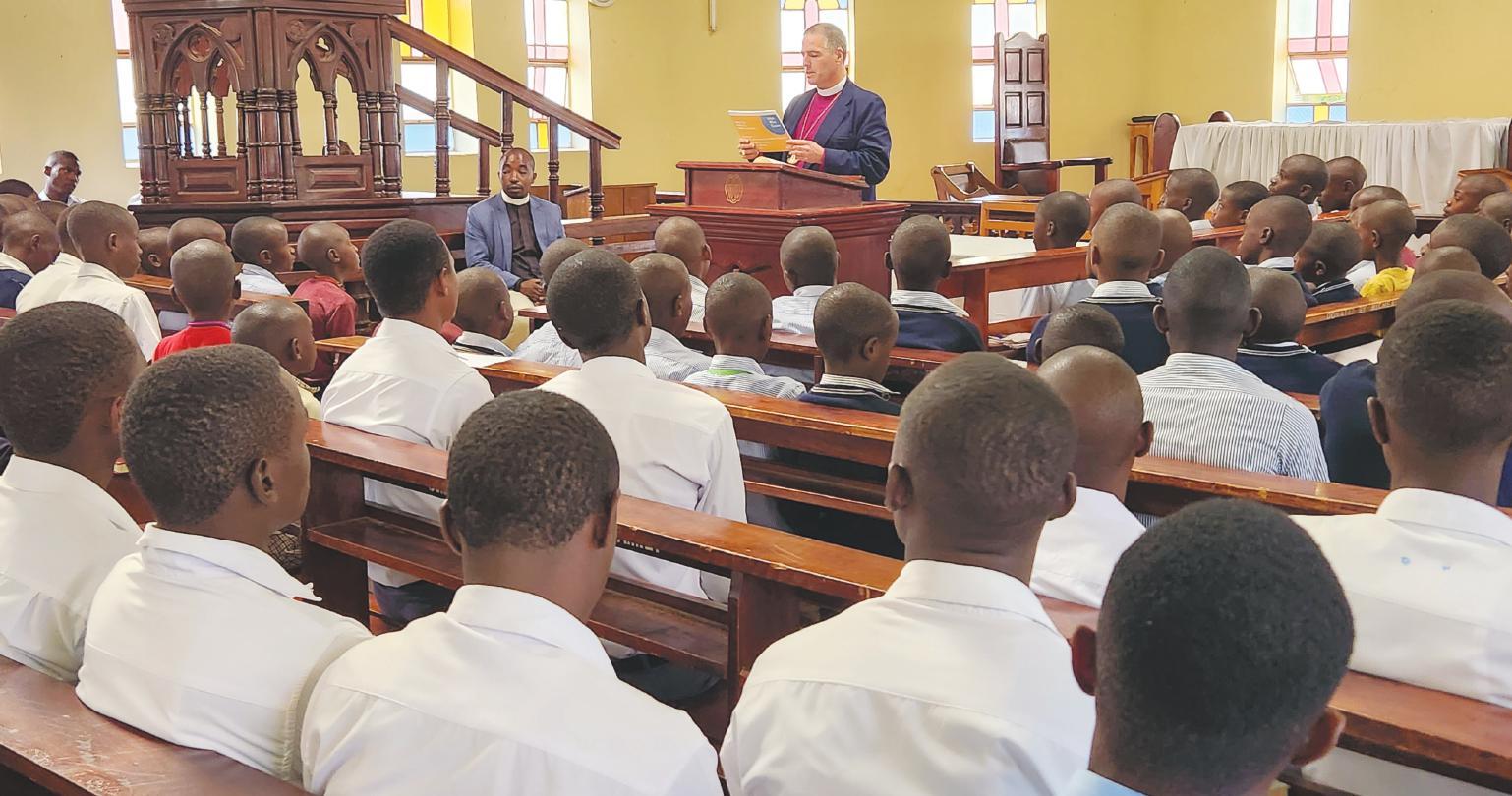
Modern quilting bee creates 16 quilts for survivors
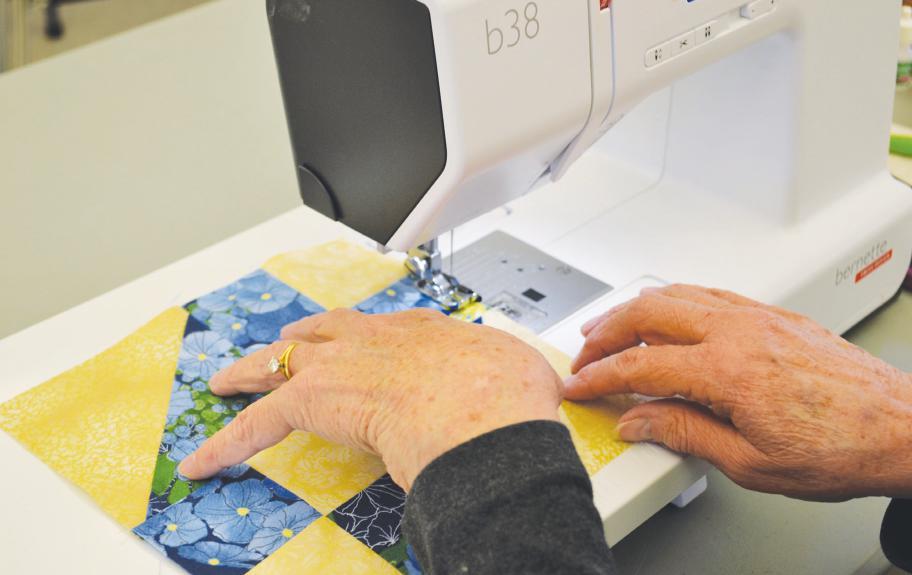 By Joanne ShurvinMartin, with files from Jacquie Berger
By Joanne ShurvinMartin, with files from Jacquie Berger

REGINA — The Prairie Piecemakers Quilters’ Guild held a two-day Sew and Go event at St. Paul’s Cathedral, and made 16 quilts for survivors of residential schools in Saskatchewan.
Among the quilters were Bishop Helen Kennedy and Rev. Paula Foster, along with many other members of the guild. A total of 15 quilters participated, including some who were not guild members.
Others brought made blocks and tops and even a completed quilt, but did not stay for the event.
Guild member Jacquie Berger explained the background of Quilts for Survivors, which is a Canadian registered not-forprofit organization. It began in June 2021, following the discovery of unmarked graves on the grounds of a former residential school near Kamloops.
Vanessa Genier, an Indigenous mother from Missanabie First Nation in Ontario, put a request on Facebook to quilters across Canada. She asked for quilt blocks that she would assemble into quilts to be given to survivors.

The support was overwhelming, with quilt blocks, fabric, other
Continued on page 12
Find the
Saskatchewan Anglican on Facebook and Issuu!
The newspaper of the Dioceses of Saskatchewan, Saskatoon and Qu’Appelle • A Section of the Anglican Journal • May 2023
3
9
10
17
Using
prayer beads a tactile way to pray
Tri-diocesan clergy retreat a success
God offers hope and safety in the psalms
Students lead service to celebrate St. Chad
Photo by Bishop Michael Hawkins
Rev. Paula Foster was one quilter at the event.
Photo by Joanne Shurvin-Martin
Discernment needed to handle disagreement on faith's essentials
Why do Christians have so many disagreements about the Eucharist (and other things)?
Rev. Dell Bornowsky
One might think that by becoming a follower of Jesus or becoming an adherent of a particular Christian tradition or church, one would find fellow believers with whom there is great agreement. Indeed this is often the case.
However, people also experience many areas of disagreement and Christians are not exempt. There are at least three ways to understand the causes of disagreements:

1) Different goals
2) The same goals but conflicting means of achieving them
3) Different understandings of the meaning and definitions of the very goals and means we are talking about
This third factor is perhaps the most subtle. We appear to disagree because the words and concepts we use don’t mean the same things to each other.
When people disagree about the Eucharist or about marriage they may think they are talking about the same thing, but I suspect their understandings of what those things fully signify is apt to be significantly different.
Recognizing that symbols and practices can be multivalent (have more than one meaning to more than one group of people) is perhaps a step toward understanding why many disagreements occur.
For example, in Western culture, after the Second World War the swastika took on a connotation almost the opposite of what it had before the war, and still has in many Buddhist and Hindu cultures.
If we understand the Eucharist to function as hospitality, as an invitation to figuratively “taste and see that the Lord is good,” then we should offer it as we would a handshake, even to nonChristians.
If we understand it as a sign of committed union
we will tend to reserve it, much as we would more intimate contact between covenant marriage spouses.
In addition to the challenge of defining sacraments from an objective perspective, each of us encounters them subjectively. What for one person might seem “an empty ritual” might be for the one beside them full of significance, consolation and heart-felt and life-transforming communication with the Lord.
It is also possible that yet another is being benefitted by the invisible grace of God in ways that they may not even perceive or are able to express.
Not only sacraments are multivalent, so also are abstract concepts such as justice, freedom, and reason.
In his book Whose Justice? Which Rationality?
Alasdair MacIntyre suggests such concepts may carry connotations derived from “rival and incompatible conceptual frameworks,” in other words, from conflicting presuppositions that could be as basic as what makes us think we know anything about them in the first place.
In the various
controversies the church faces, the correctness of our own opinions are often so obvious to us that we assume any person trying to be reasonable, loving and faithful would agree with our conclusions.
When we discover that some do not, it is easy to conclude that they must not be reasonable, loving or faithful.
However, upon reflection we may realize that if we accepted the same presuppositions about the meanings and function of things like the Eucharist and marriage, we would probably not disagree with them.
One classic attempt to maximise functional co-operation between Christians with different opinions is the saying: In Essentials Unity, In NonEssentials Liberty, In All Things Charity. (proposed by Rupertus Meldenius during the bloody Thirty Years’ War prior to the eventual “Peace of Westphalia” in 1648.)
When it comes to unity, simple uniformity is not nearly as rich and beautiful as the harmony that can be produced precisely because there is great diversity. However, such harmony requires the submission of all the parts to the purposes of the whole.
Published by the Dioceses of Saskatchewan, Saskatoon and Qu’Appelle. Published monthly except for July and August.

Whole No. 292, Vol. 51, No. 9 A Section of the Anglican Journal
SUBSCRIPTIONS
For change of address, undeliverable copies and subscription list updates, contact:
• Your parish
• e-mail: circulation @national.anglican.ca
• Or send to Saskatchewan Anglican, c/o Anglican Journal, 80 Hayden Street, Toronto, Ont. M4Y 3G2


RATES
$10 in Canada
$17 outside Canada
SUBMISSIONS
As for liberty and charity, it is suggested that unity might be maintained if we just “agree to disagree.” This may work well for a few things.
However, if I am trying to dig a hole but you are trying to fill it in, as much as we love each other and allow each other our liberty, our attempts at co-operation will be frustrating, self-defeating and absurd.
Meldenius’ saying exhorts us, as Jesus and the Pharisees were doing, to sort out which of the LORD’s instructions take precedence over others.
However even this hopeful ideal will fail if we cannot even agree what is essential and what is not.
When partnerships dissolve because of “irreconcilable differences,” perhaps even more significant than what the particular differences are, is what causes them to be thought of as irreconcilable.
It remains to be seen how much wider the cracks in global Anglicanism will become. If our differences turn out to be as irreconcilable as some of them seem at present, perhaps this little reflection on the meaning of meaning might at least help us understand why.
Submissions for the June issue must be received by the diocesan editor no later than April 30. All pictures must be sent as JPEGS and 1 MB (megabyte) in size.
CONTACT INFORMATION
Managing Editor: Jason Antonio SKAnglicanEditor@gmail. com
1501 College Ave Regina, Sask., S4P 1B8 Phone: 306-737-4898
Qu’Appelle: Joanne Shurvin-Martin joannesm@myaccess.ca
6927 Farrell Bay Regina, Sask., S4X 3V4 Phone: 306-775-2629
Saskatoon: Peter Coolen ptrcoolen@sasktel.net 820 Avenue I South, Saskatoon, Sask., S7M 1Z3 Phone: 306-244-0935,
Saskatchewan: Mary Brown mary1949brown@gmail.com Box 25, Shellbrook, Sask., S0J 2E0 306-922-5159
Advertising agent: Angela Rush saskatchewan.anglican.ads@ gmail.com 905-630-0390
PUBLISHING DETAILS Published
2 The Saskatchewan Anglican May 2023
from 59 Roberts Place Regina, Sask., S4T 6K5
Photo courtesy Mohamed Hassan/Pixabay.com
The Bishop's Corner
Using prayer beads a tactile way to pray
By Bishop Helen Kennedy
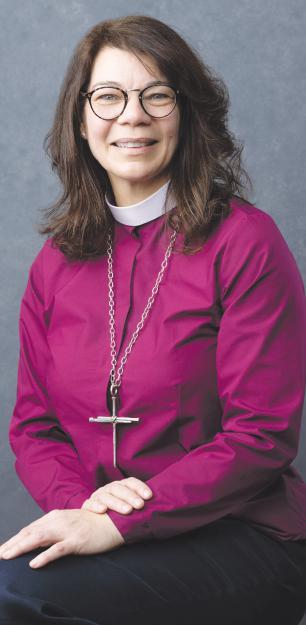
We cannot know with any certainty when prayer came into being since there are not enough archaeological records to draw a reliable conclusion.
During the ages and development of human history, prayer has gone through (and continues to go through) a series of metamorphoses in its purpose, understanding and acceptance, making prayer an evolving and expanding practice.
There is no “right way” to pray. Connection with the divine is a style preference, with no prescribed performance involved.
Christian prayer is located squarely in the effort and action of the God of creation, seeking wholeness for the created. As prayers have matured and become systemized, the development of patterns of prayer were established.
These patterns are the forerunners to liturgy and liturgical prayers.
Any and all prayer is an invitation from God for us to participate in God’s life and action in the world. According to the theologian Karl Barth, there is no invidious distinction between public and private prayer.
One may and must pray alone, but it is always the church at prayer, whether we are alone or assembled.
Prayer beads are one type of many types that engages the body in prayer with the aid of a simple hand-held string of beads. The exact origins of prayer beads remain uncertain, but their earliest apparent use was found on wall paintings in Akrotiri in Greece, dating from the 17th century BC. These images, painted millennia ago, depict a woman holding a string of beads during a ceremonial rite.
Throughout antiquity most civilisations have strung beads together for religious or ritual practices. All major religions have used beads to count prayers, including Christian, Buddhist, Hindu, and Muslim.
There are also roots to bead prayer practices
of the Desert Mothers and Fathers in the third century; the prayer beads were either kept in a pocket or bag and as a prayer was said, a bead was dropped into the bag.
Praying with beads is a tactile way to pray. The pray-er holds the beads with their fingers, moving them one after another.
It is an embodied form of prayer as it involves one’s
sense of touch.
Thus, your prayer becomes more than thoughts and words; it becomes a physical activity and it can be grounding or comforting to have beads to hold and help focus.
Anglican Prayer Beads are a relatively new form of prayer with beads.

It consisted of 33 beads, which represent the years of Jesus’ earthly life. The beads start with a cross to remind us of Christ’s act of salvation for us.
The cross is a reminder of our identity as Christians and of Jesus’s call for us to take up our own cross and follow Him. It speaks of the lengths God is willing to go to reach us.
It is our entry into the circle of prayer.
The bead above the cross is the “Invitatory Bead.” It is an invitation to trust God; to offer our worship, our praise, our whole life. Then there are four “Cruciform Beads” that form the shape of the cross; the number four reminds us of the four Gospels and the four seasons of the year, the
four directions.
Between each of these beads are seven smaller “Week Beads;” the number seven represents spiritual perfection. This is not static perfection, but the ongoing work of God in all of us.
The “week beads” also reminds us of the seven days of Creation and the seven seasons of the liturgical year. Often they are done three times for Father, Son, and Holy Spirit.
As there is no set “formula” for the Anglican Prayer beads, pray-ers can develop prayers for use that reflect their own spiritual journey.
It becomes a way to deepen one’s prayer life by encouraging not only the mind but the body to participate in prayer.
Praying Bible verses from bead to bead can make one newly aware of their meaning.
Using beads illuminates the fundamental principle that prayer cannot be rushed.
It takes time to slow down and draw close to God and become aware of God’s work around us.
Our participation in the work of God is the action of being co-creators of our world. It is our responsibility and joy to be this engaged with God and God’s creation.
If you have never used prayer beads, I would very much encourage you to do so, either for a season, or as a regular spiritual practice.
Blessings on your prayers.
Clarification
The article about celebrating Black History Month at Immanuel Anglican Church, Regina, in the April Saskatchewan Anglican contained some misleading information. It should have said:
Lift Every Voice and Sing is known as the Black or Negro National Anthem, and originated in Jacksonville, Florida.
May 2023 The Saskatchewan Anglican 3
An example of Anglican prayer beads.
Photo by Jason G. Antonio
g Saskatchewan Anglican online! Did you know you can read current and past issues of the Saskatchewan Anglican online?
Visit www. anglicandiocesesaskatoon. com/saskanglican or on Facebook at www.facebook.com/ saskatchewananglican
g Please note that if you are considering attending any church service in person , please check on service availability and any requirements for preregistration that may exist.
If attending services, please follow all the indicated seating, movement, distancing, masking, and sanitization instructions.
g Service Books
available : Emmanuel Anglican Parish, Saskatoon has changed its service format to an audio-visual one and as a result has a large number of service books to be given away.
If you would like to pick up a small or a large lot of copies of Common Praise, Book of Alternative Services or others please contact Loretta Hartsook at 306-
Whitewood ecumenical tradition continues
By Phyllis Armstrong
WHITEWOOD (Qu’A) — Churches in Whitewood continued a Lenten tradition that began in 1989. Every Wednesday, people gather at noon for a service and lunch. The services were held in St. Mary the Virgin Anglican Church and the United Church the past three years.
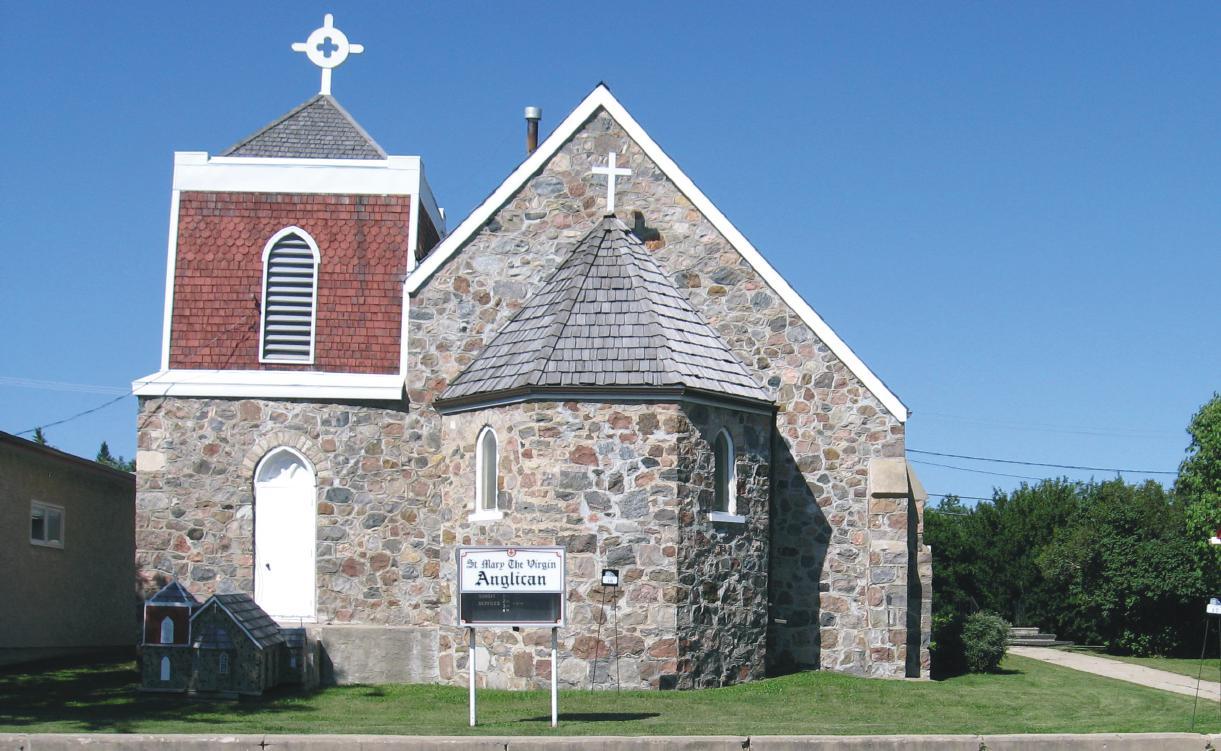
After no Lenten services in 2021 and services but no lunch in 2022, the tradition returned in full in 2022. Each year an ecumenical Good Friday 'Walk of The Cross' is also held with all churches participating.
Announcements for May 2023
321-5087 or hartsook@ sasktel.net.
g School of Discipleship Ministry Preparation Program: The Diocese of Saskatoon’s School of Discipleship Ministry Preparation Program is a part-time three-year licentiate.
Students may take a course part way through the three-year cycle unless pre-requisites for a specific course are stated.
The first full complement for the ESC licentiate in theology is planned to be completed by spring 2023.
People wishing to take one or more of these courses should consult with the School of Discipleship coordinator.
People who sense a call to diaconal or priestly ordination will go through the diocesan discernment process at some point before the midway point.
See the notices of the WECAN and Evangelism courses posted elsewhere in this issue.
If you have any questions about our Ministry Preparation Program, please contact the School of Discipleship co-
ordinator, the Rev. Dr. Trish McCarthy, at tmccarthy@sasktel.net, 306-370-8378 and see the course listings posted elsewhere in this issue.
g Courses at the College of Emmanuel: The College of Emmanuel & St. Chad welcomes inquiries and applicants for its courses. For information on courses available from Emmanuel & St Chad and through the Saskatoon Theological Union, please contact their office at 306-9751550
g Safe Church Workshops : All clergy and wardens are reminded that they should have taken both parts of the Safe Church Workshops by the end of May. Please see the notice elsewhere in the issue in regard to the dates and information for registration for the final workshops in this program.
g 75th Synod of the Diocese of Saskatoon: Notice is hereby given that the 75th Synod of the Diocese of Saskatoon will take place on Friday, May 5 and Saturday, May 6 at St. John’s Cathedral
– 816 Spadina Crescent East, Saskatoon.
This is a regular meeting of Synod for the purpose of electing officers, receiving reports and other business.
Members of Synod are invited to submit notices of motions to the Synod Agenda and Resolutions Committee, in care of the diocesan office.
Notices received by 4:30 p.m. on Monday, April 3 will be included in the materials distributed to Synod members in advance of the meeting. Notices of motions may be accepted after May 5 with the consent of Synod.
You may submit either electronically to anglicansynod@ sasktel.net, or by post by mailing them to Diocese of Saskatoon, 1403 – 9th Av North, Saskatoon, SK S7K 2Z6.
In keeping with protecting our environment and “going green,” the convening circular will be e-mailed.
g General Synod 2023:
It has been announced that the next General Synod of the Anglican Church of Canada will be held from June 27 to July 2 at the University of Calgary, Calgary,
Alberta.
Delegates to Synod 2023 should be receiving information packages by e-mail or regular mail over the next several months.
g Erratum: In the March issue (pg. 5) the caption for the picture of Bishop Chris and Tracey Harper accepting a gift of sweetgrass braids at his farewell luncheon should have included the information that the sweetgrass braids were provided by Claude and Judith Hutton of the parish of the Cathedral of St. John the Evangelist.
g To be included in a timely manner, brief notices should be supplied to the associate editor by fax, email or “snail mail” by the end of the month, one month before the month in which the insertion is desired (i.e. February entries will be in the April issue).
Detailed and longer texts of upcoming events will not be included in this section, but should space allow, could be the subject of articles and notices elsewhere in the Saskatchewan Anglican.
4 The Saskatchewan Anglican May 2023
D I O C E S E O F S A S K A T O O N E V E N T S
File photo
St. Mary the Virgin Anglican in Whitewood.
St. Aidan Lenten retreat focuses on pretzels and prayers
By Ellen Duffield
MOOSE JAW (Qu’A) — On St. Patrick’s Day, March 17, the St. Aidan family gathered for the opening of their annual Lenten Retreat.
About 48 people attended the weekend event. The unlikely theme was Pretzels and Prayers, a window into the experiential nature of their time together.
The Gospel of John is a “come and see” book that begins with the language of theatre. John writes as one who “beheld” Jesus’ glory. This word is carefully chosen. It speaks of an actor on stage who can be seen from all angles.
In Jesus’ day theatres were more like coliseums, with actors often booed and bloodied. John, amazed, sets the stage for us to closely observe as Jesus steps into this arena.
In vignette after vignette, we see Him bringing people along, eating at their tables and inviting them to His. Jesus was often misunderstood, mocked and mistreated as He did.
Some of the most astounding snapshots are offered in seven “I Am” statements that are bookended by “the Bread of Life” and “the true Vine.” In Jesus’ day, nothing could be more ordinary than bread and wine. Nothing could be more sacred than these symbols in the Eucharist and wedding feast to come.
How then do we enter in? By eating and drinking of course. As Rev. Dean Pinter so rightly said as he welcomed us into the retreat, “As human beings we got into trouble through eating. And it is also our way out.”
After a musical prelude with Rhoda Cairns and a reflection on John 15, we were guided from soil and toil to vine and wine by Doug Reichel.
He guided us as we sampled wines from three countries and learned about the critical role of the Vinedresser, who prunes and tends the vines; the theological symbolism of the Vine and homecoming; the counterintuitive value of rocky soil to flourishing vineyards; and the art of paying attention.

On Saturday morning, we were met by the
aroma of fresh coffee as we gathered at tables to make pretzels. Pretzels are believed to have been used by monks in the AD 600s to teach children to pray (and keep them quiet during prayers).
According to legend, a young Italian monk who was preparing unleavened bread for Lent twisted leftover pieces into shapes that he called “pretioloa,” which is Latin for “little reward.”
As we rolled, flipped, and topped the dough, Michelle Josefson noted how the spaciousness of pretzels felt like an invitation for us to make room.


Kyleigh Coad spoke of the twisting and turnings of the dough and of our lives, and we were invited to think of the shape as a prayer labyrinth, and to discuss the meanderings of our lives through the lens of God’s careful crafting.
In an unexpected twist (pun intended), one of our youngest parishioners, Benjamin Kayler, stole the show when he asked the retreat speaker to read aloud the book about pretzels that his mother had brought from home, climbing happily onto her lap as she wrapped her arms around him to hold the book.
Yvonne Mitchell noted the symbolism of the mother-father arms of God wrapped around us, a theme that would be seen again and again.
It was there in the crossed arms of figures in
Continued on page 6
May 2023 The Saskatchewan Anglican 5
Participants at St. Aidan's Pretzels and Prayers Retreat made pretzels from scratch, learned the history of this special type of bread and were taught the many layers of symbolism in the shape. Photos by Tim Duffield
Retreatants enjoyed wine as they learned about the theological symbolism of vines and wine.
The pretzel shape comes into existence.
Perry Siddons ordained deacon in Prince Albert
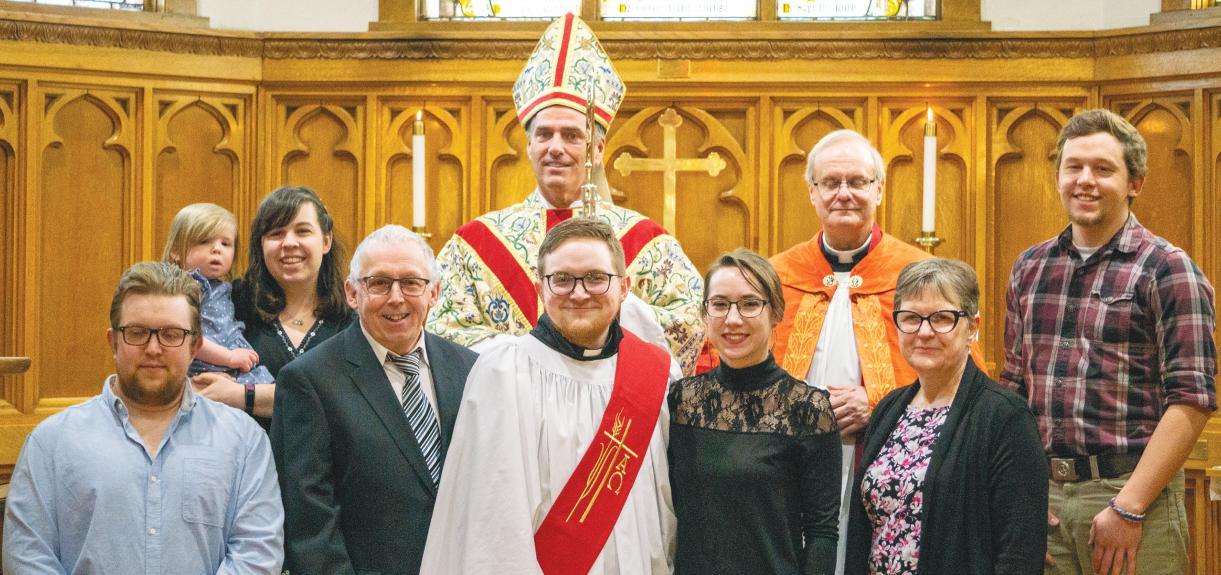 By Mary Brown
By Mary Brown
PRINCE ALBERT — In St. Alban’s Cathedral Church on March 4, Perry Siddons was ordained deacon and licensed to St. David’s Church.
The Rev. Amy Bunce, from St. Stephen’s Church in Saskatoon, delivered the sermon. The readings were 1 Timothy 3:813 and Acts 6:1-7. The first reading speaks of deacons who are to be worthy of respect, sincere, not indulging in much wine and not pursuing dishonest gain.
In Acts it tells the story of the number of disciples increasing to where they neglect the ministry of the word of God, in order to wait on tables.
So, the disciples chose seven men full of spirit and wisdom and had them distribute food. They presented them to the apostles, who prayed and laid hands on them; they became known as deacons.
In her sermon, Bunce pointed out that these seven men were not just supposed to have a talent for knowing where to place cutlery but to have the spirit of God and wisdom, because serving others, especially the vulnerable and outsiders, is at the heart of the Gospel.
Jesus multiplied
loaves and fish to feed the hungry. He cares about feeding us, body, mind, and spirit. He calls deacons to serve at the table and in His church.
She noted that deacons — a.k.a table servers — can learn from servers in their favourite restaurants.
She proposed that there are two main negative server types: those who really don’t care and would like to be anywhere else but where they are, and those who overdo
it, laying on smarmy upselling pressures.
Perry should not be the server who exudes a sense of boredom as he begrudgingly takes others’ orders and has no tableside manner (bedside manner is important in ministry in hospitals).
He should care, know the menu, anticipate needs, respond with compassion and understanding. Get to know the people he serves, hear their stories, their hunger, feel their pain and share their joy.
Then there are the waiters who act like they are too good to serve you, who look down on you for mispronouncing the menu items — they do not understand the art of service. Good servers see the person at the table as someone to welcome, know and help with gentleness.
Deacons are like good servers, gently guiding, making you welcome knowing what is good to eat because they have tasted and they have seen that the Lord is good.
In closing Bunce told Siddon that in all he does and in who he is, he should know that he belongs to Christ and has been claimed as His own forever. Christ died for him and all of us; He gave Perry his life and set him free to love and serve Him.
Perry and his wife Andrea live in Saskatoon where he follows Michael Lyons and Brody Albers by helping at St. Stephen’s Church, under Rev. Amy Bunce. He will finish his studies at Briercrest.
... Learning the symbolism with a pretzel's shape
Continued from page 5 the stained glass window prayer walk and the encompassing warmth of the handmade prayer shawls.
It was there in the embrace of parents guiding their children’s hands to paint prayer stones or make pretzels, and the postures of congregants on their knees, armed clasped
across their chest, some with tears streaming down their faces.
The insights came full circle as together we ground mustard seeds and mixed a batch of the pungent condiment to accompany our pretzel and chili lunch, made by Carla Hoffman.
When Darius, king of the Persians, invaded Europe and met Alexander
the Great, it is said he sent Alexander a bag of sesame seeds as a taunt, indicating the multitude of soldiers he had. Alexander sent back a bag of mustard seed with the message, “You may be many, but we are powerful. We can handle you.”
When Jesus spoke of a kingdom that was like a mustard seed, he spoke not of crushing but of being
crushed. Not of hurting but of healing. Not of fanfare but of unexpected influence.
Mustard, the official sponsor of the Jesus revolution: a healing balm, a cleansing agent, a sign of pervasive, fruitful, upsidedown power, and a great accompaniment to prayer and pretzels.
And here is the full circle moment, mustard
The Table Will Be Wide
Rev. Jan Richardson
—a crop so important to Saskatchewan — is thought to come from the Latin mustum meaning “burning must.”
This is a contraction of the spicy heat of the seeds and the ancient practice of mixing them with must, the unfermented juice of wine grapes. Bread and vine. Pretzels and wine. Pungent mustard. And a table that is wide.
For those who thirst. And the blessed Will become a blessing. And everywhere Will be the feast.
6 The Saskatchewan Anglican May 2023
This poem was during St. Aidan’s retreat. The Table Will Be Wide
And the table Will be wide. And the welcome Will be wide. And the arms Will open wide To gather us in. And our hearts Will open wide To receive. And we will come As children who trust There is enough. And we will come Unhindered and free. And our aching Will be met With bread. And our sorrow Will be met With wine. And we will open our hands To the feast Without shame. And we will turn Toward each other Without fear. And we will give up Our appetite For despair. And we will taste And know Of delight.
we
By
And
will become bread
For a hungering world. And we will become drink
New Deacon Perry Siddons poses with friends and family after the service. In back, from left, are Myla Cole, Anna Cole, Bishop Michael Hawkins, Ven. Dan Hughes, and Ted Siddons. In front, from left, are Mark Siddons, Jim Siddons, Perry Siddons, Andrea Siddons and Sandy Siddons. Photo contributed
God offers hope, protection, safety in the psalms
By Mary Brown
WASKISEU (Skwn) —
About 70 people gathered for a conference on the Psalms of Ascent at the Hawoood Inn in Waskiseu from March 17-19.
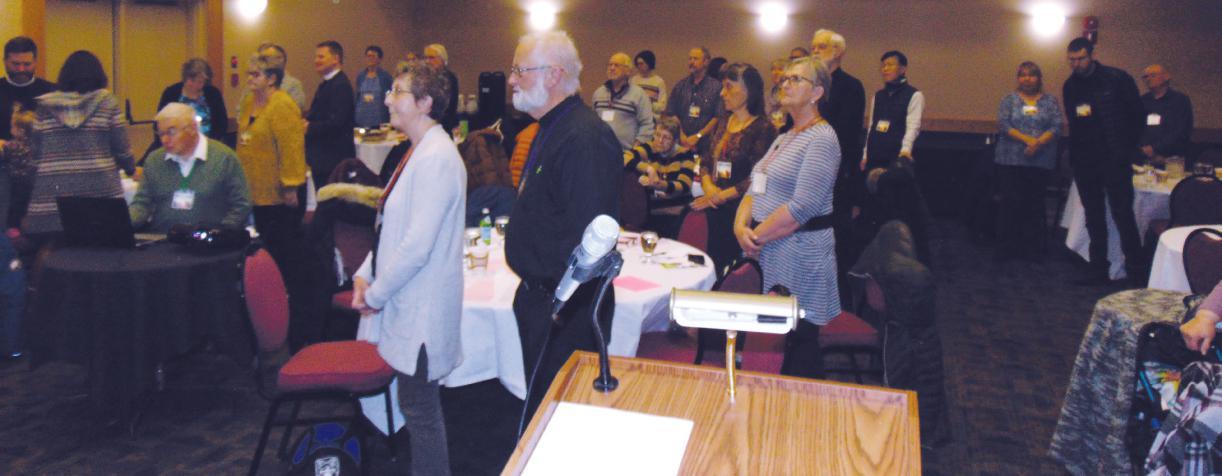
The Rev. Ted Williams, priest for Tisdale and Melfort, opened the meetings leading us in evening prayer, followed by a delicious supper of prime rib with all the trimmings.
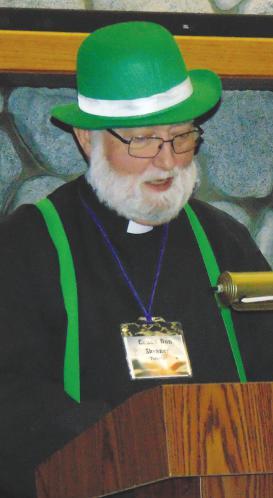
The Rev. Canon Don Skinner introduced the theme of the weekend by recalling what he learned at the clergy retreat, that we know that God is living and active and already has a vision and a plan for us.
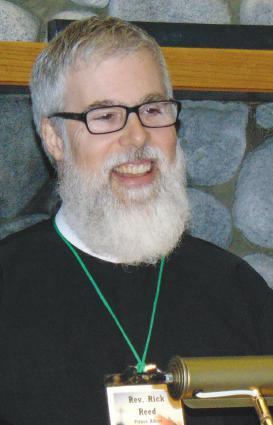
As we look to the future of our diocese, what we need at the outset is to discover “what God is up to.” In Genesis 1:3 God commanded that there be light, and light appeared.
In 1 Samuel 3 God speaks to him three times before he realizes it is God speaking.
Our task is to offer ourselves in listening to God. When we read the Scriptures, we know we are safe.
Skinner outlined three things to remember:
1) Expectancy — God will speak through the Scriptures if we expect Him to
2) Humility — not my will but Yours be done
3) Obey — the way to hear God’s voice is our willingness to obey
The conference was divided into three sessions. The participants were divided into table groups with an appointed leader and someone to write down observations from the group.
These observations were to be presented after the final session the next afternoon.
The first session discussed Psalm 130. Following the conclusion of the session the Rev. Jordan Draper, priest in Birch Hills, Kinistino and Muskoday, led everyone in compline (including Psalm 134).
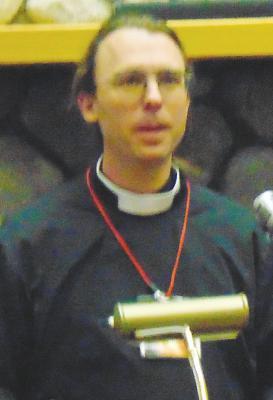

On Saturday morning the Rev. Michael Lyons, priest in Christopher Lake, led us in morning prayer, after which the Rev. Rick Reed introduced the second session, “Listening to the God who speaks.”
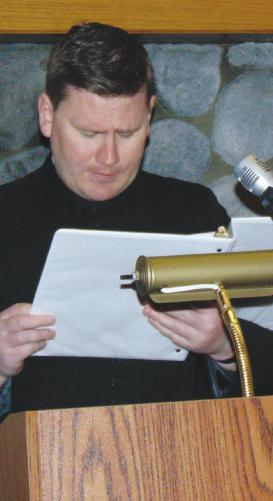
In his preparation to introduce this topic, he asked, “God what is it you want me to say?”
The first thing the Lord said to him was remember from where you came Reed shared with us his journey to the Lord saying the day he understood that God speaks, he knew hearing from God and speaking to God was prayer. Everyone’s journey is different, a time where we heard God’s voice.
The second thing the Lord said to him was don’t overlook the obvious. Holy Scriptures is the obvious. Yet how many of us overlook the obvious, daily, or weekly, when the word of the Lord is read or proclaimed, not expecting to hear the Lord speak to us or our church community?
The third thing the Lord said to him was remember we are in a spiritual war Reed believes that
prophets and apostles understood that to stand firm against injustice, oppression, greed, lies and apathy in our world, to speak and stand firm in what we believe to walk a path of holiness living and speaking truth as holy conscience is to participate directly and indirectly in a cosmic battle that has engulfed the Earth since Genesis 3.
Before a break for lunch table groups discussed
Psalm 124, and after lunch, they concluded their discussions with Psalm 121.
The table leaders then reported their findings. In all the psalms the message is hope, protection and safety. We are lulled into a fear of failure, but the Lord is calling us to trust in the Lord.
God says I have your back — now go out and do something risky for me. We have to be people who are developing a language of hope and action of hope. We can be obsessed with anger but there is forgiveness — repentance is where real change happens.
Two pieces of advice at the last judgment — plead guilty and shut up.
Listen to God to get encouragement and strength in the future. His diocese, His church, we are His people, we are in His hands. The worksheets from each table group were collected and will be interpreted resulting in a comprehensive statement for consideration.

The conference closed with Bishop Michael Hawkins conducting a Holy Communion service. His sermon, he said, was more a message to himself.
Observing that humility should be our first requirement in worshipping God, a selfmade man worships his Creator.
Hawkins referred to Psalm 10, a prayer for justice, and Psalm 46, God is our shelter and our strength always ready to help in times of trouble; be still and know that I am God. The work of God is to believe and receive Jesus Christ.
May 2023 The Saskatchewan Anglican 7
About 70 people attended the Diocese of Saskatchewan's conference about the Psalms of Ascent, held on March 17 in Waskiseu. Photos by Mary Brown
Rev. Don Skinner, Turtleford
Rev. Jordan Draper, Birch Hills, Kinistino, Muskoday
Rev. Michael Lyons, Christopher Lake
Rev. Ted Williams, Tisdale and Melfort Rev. Rick Reed
Eva Marie Butorac, daughter of Dean David Butorac
Refugee program thanks leaders with supper
By the Rev. Peter Coolen
SASKATOON — On March 18, 50 people attended a buffet supper held by the Diocese of Saskatoon Refugee Program at Zion Lutheran Church to bid farewell to Archbishop (Bishop) Chris Harper and his wife Tracey, the former heads of the program and to welcome Executive Archdeacon Alex Parsons and his wife Shelley Sadoway as the new program heads.
The diocesan program has been in place for 30 years and has made a significant contribution to the cause of bringing refugees to Saskatchewan and helping them to settle into their new home.
Tigst Gebeyehu, the diocesan refugee coordinator, began the evening by welcoming everyone and giving a summary of the diocesan refugee program.
After introductions, four leaders of local church communities who had received refugees from the program spoke and gave thanks for the work of the diocese in supporting them and their members.
Those four members included Mousa
Fadllemawla of Wakati Wa Kafrica, Dr. Jemanesh Haile of Debre Birhan Holy Trinity and St. Michael Church of Ethiopean Orthodox Tewaheda, Saskatoon, Pastor Morakinyo Akinola of New Covenant Church, and Halima Hussein of Truly Alive Youth and Family Foundation Inc.
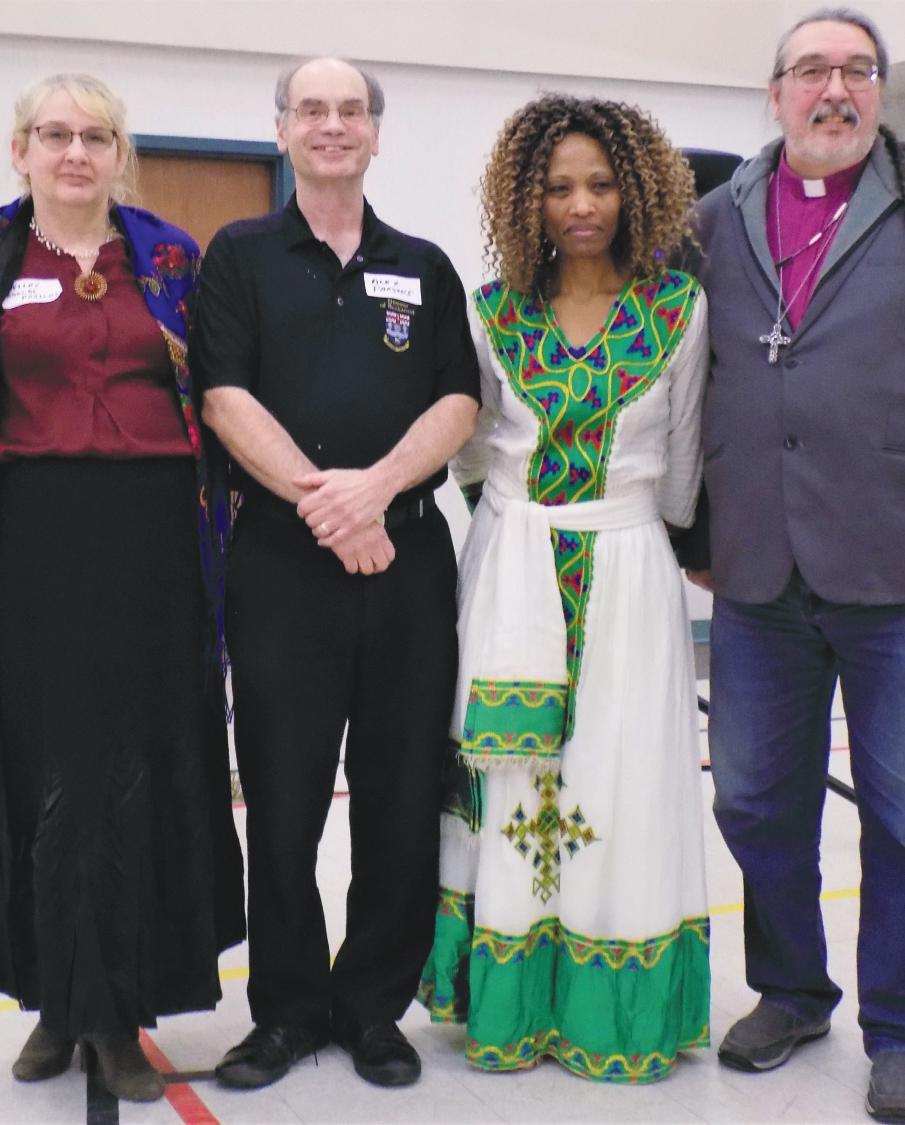
Following the church leaders, Archbishop Chris spoke, giving thanks for all the work of the groups that have helped the diocese to assist the program and the refugees who have been supported by the program.
He also spoke of the continuing and growing number of refugees in the world now due to the everincreasing number and amount of conflicts and the growing need for more refugee support.
After speaking, Archbishop Chris then introduced Alex Parsons who spoke about his past involvement in the program and his hopes for increased work in this area in the future.
The buffet meal for the evening consisted of a large variety of ethnic foods representing many of the cultures from which refugees supported by the program had come.
Even more Platinum Jubilee medals for Qu'Appelle people
By Joanne Shurvin-Martin
REGINA — Florence Holt says proudly, “I am 94, and have been an Anglican my whole life.”
She adds the same is true for her volunteerism. She lists a few of the things she has done as a volunteer: driving cancer patients, delivering Meals on Wheels, serving as secretary and treasurer of local groups, and working on local events.
She is also a member of the Royal Canadian Legion and the Grandmothers for Grandmothers group.
Holt said she was very surprised to receive the Queen’s Platinum Jubilee medal. She says, “I have celebrated with family and friends with countless greetings from across the country.”
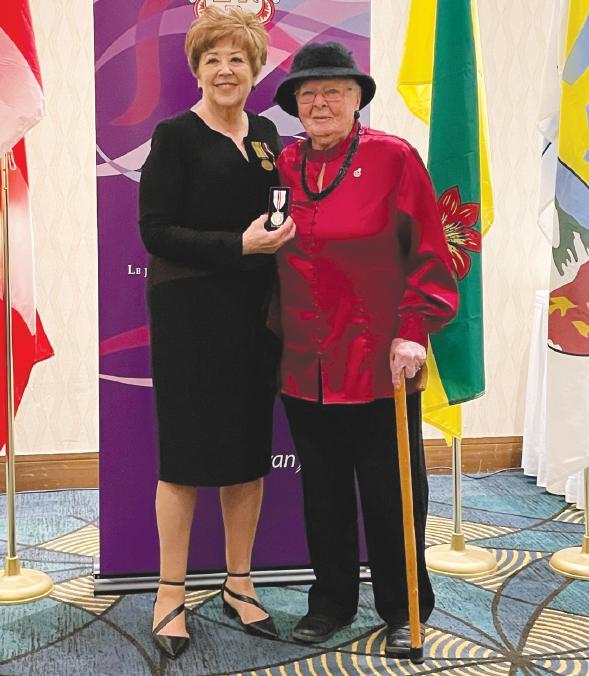
She says that All Saints, Lumsden has been
her church for decades, and that she previously attended St. Peter’s and St. Mary’s, Regina.
She reports that she and her husband travelled widely in Canada, the U.S. and other countries, and they always sought a church with which to celebrate, from worshipping with the first bishop of the Navaho Nation, to with Maoris (in New Zealand) to Pope Paul, “not matter the affiliation, God’s message was everywhere we went.”
Holt received the Platinum Jubilee medal from Randy Gouden, president of Saskatchewan Urban Municipalities Association, on Feb. 3. The citation recognizes “your valuable service to your community and Province.”
Robert Currie, a former Poet Laurate of Saskatchewan and a member of St. Aidan,
Moose Jaw, received the Queen’s Platinum Jubilee medal from Lieutenant Governor Russ Mirasty in a ceremony at Government House on Feb. 28.
He had been nominated by the Saskatchewan Writers’ Guild, and honoured for his contributions to the provincial writing community.
Currie has written 13 books, and is a recipient of the Lieutenant Governor’s Award for Lifetime Achievement in the Arts.
He was one of the four founders of Coteau Books, and served on its board for 40 years. Currie is also a founding member of the Saskatchewan Festival of Words, with 23 years of service on its board.
At St. Aidan, he acts as a lector (reading the Bible during services), counts the collection, and serves as a greeter.
8 The Saskatchewan Anglican May 2023
At the March 18th Diocese of Saskatoon Refugee Program Supper those present said adieu to Archbishop Chris Harper and his wife Tracey and welcome to Executive Archdeacon Alex Parsons and his wife, Shelley Sadoway. Pictured at the dinner (from left) are: Shelley Sadoway, Executive Archdeacon Alex Parsons, Tigist Gebeyehn and Archbishop Chris Harper.
Photo by Rev. Peter Coolen
Randy Goulden, president of the Saskatchewan Urban Municipalities Association (left), presents the Platinum Jubilee Medal to Florence Holt.
Photo courtesy SUMA
New prayer shawl ministry wraps people in love
 By Joanne Shurvin-Martin
By Joanne Shurvin-Martin
REGINA — Bishop Helen
Kennedy has initiated a diocesan prayer shawl ministry to provide hand-made shawls for the Seniors’ Care Home Ministry and for hospital visitors.
Shawls, whether knit or crocheted, are a tangible reminder of loving support and prayer for the recipient. As the pamphlet that explains the program and provides a few patterns says, “Every inch of the yarn will have passed through your fingers and will eventually embrace another. There are plenty of reasons where the warmth of another’s love is needed.”
Many parishes have similar ministries, where parishioners knit or crochet shawls, afghans, baby blankets and more, which are blessed and given to parishioners and strangers.
If you are interested in making a prayer shawl, the diocesan website (quappelle.anglican.ca) is an excellent starting point. Go to the Ministry tab, where you will find a description of the new program, several patterns and prayers, and suggestions for further reference.
The Synod Office in Regina has a supply of donated yarn available to any knitters or crocheters who are interested in supporting this ministry.
Tri-diocesan clergy retreat in Saskatoon a great success
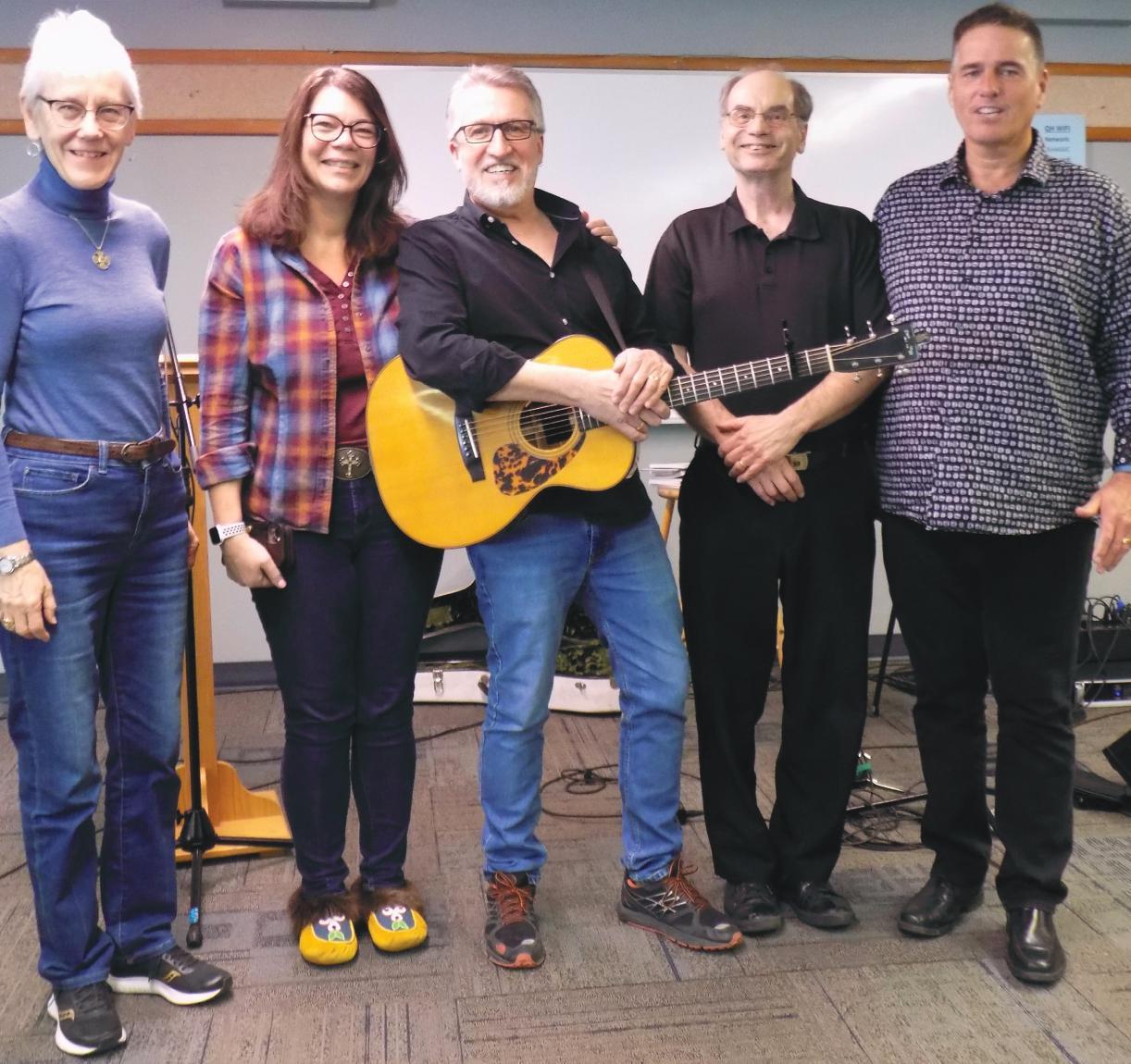 By the Rev. Peter Coolen
By the Rev. Peter Coolen
SASKATOON — Fortythree clergy from the dioceses of Saskatchewan, Saskatoon and Qu’Appelle attended the March 20-22 tri-diocesan retreat in Saskatoon at the Queen’s House Retreat Centre. Also attending were the Primate, Archbishop Linda Nichols, Bishop Michael Hawkins (Diocese of Saskatchewan), Bishop Helen Kennedy (Diocese of Qu’Appelle), the Venerable Alex Parsons (administrator and executive archdeacon, Diocese of Saskatoon), and Christian recording artist Steve Bell.
Besides mealtimes, quiet time, social time and time for quiet reflection, Morning and Evening Prayer and Compline Services were conducted by Archbishop Nicholls, Bishop Kennedy, Bishop Hawkins and Parsons. Bell entertained and provided musical inspiration while the Primate spoke about clergy having resilience, empathy and mindfulness dealing with their life and ministry.
Meanwhile, Bishop Helen reflected on where clergy find joy in life, where they felt it in the past and how they can find and reclaim it.
Attendees said they enjoyed the sessions' informal nature and the social times where they could mingle, renew and also make new acquaintances.
May 2023 The Saskatchewan Anglican 9
Prayer shawls are a tangible reminder of love, support and prayer for the recipient.
Photo by Joanne Shurvin-Martin
Attendees at the March Tri-Diocesan Retreat held at Queen’s House Retreat Centre included (from left) The Primate, Archbishop Linda Nicholls, Bishop Helen Kennedy (Diocese of Qu’Appelle), Steve Bell, The Venerable Alex Parsons (administrator and executive archdeacon, Diocese of Saskatoon), and Bishop Michael Hawkins (Diocese of Saskatchewan).
Photo by Rev. Peter Coolen
One stitch, dignity kit, and girl at a time
By Kathy Hawkins
PRINCE ALBERT — The Diocese of Saskatchewan
Days for Girls team has been donating and working tirelessly, knitting and crocheting, sewing and serging, trimming and turning, pressing and folding dignity kit contents since September 2022.
Their efforts have accumulated to over 300 menstrual hygiene products that are friendly, comfortable, healthy, clean, and costeffective. The diocese has also partnered with our Hutterite sisters who have produced 100 additional dignity kits.
The provision of the kits involves two initiatives: their physical distribution and the presentation of education related to menstruation, female and male sexual health, and the use of the kits.
Whoever distributes the kits must also handle the education component, and Kathy and Michael Hawkins are Days for Girls Ambassadors who have undergone culturally sensitive training on how to present the educational components, which are customized for male and female audiences.
These kits don’t look like traditional pads as the bright colours camouflage staining. The flannelette absorbent liners unfold to look like a washcloth, which allows the women to wash and dry them, outside in the African sun without causing embarrassment. These kits will last up to five years.
Kit contents, time and cost approximations for 400 units:
• 1 hand knit or crocheted washcloth, 1 hour of work + $0.75 of cotton handcrafter yarn x 400
• 2 pair new panties + $1 per panty x 800
• 2 cotton and polyurethane laminate lined shields 1 hr per + $2 cotton + (PUL $0.58 each) x 800
• 8 flannelette liners 4 hrs cutting and serging per 8 + $1 each = $8.00 x 3,200
• 2 Ziploc bags 1 gallon + $0.45 each x 800
• 1 drawstring bag cotton 1 hour per bag + $2.50 each + $1 ribbon x 400
•
• 1 hotel size bar soap (donation from Coronet Hotel Prince Albert) x 400
• 1 calendar sheet/care instructions x 400
There are 2,000 working
hours in a year, so this project is equivalent to employing 1.6 women working 9 a.m. to 5 p.m. for an entire year! A true labour of love; this
Days for Girls team was amazing!
These 400 kits were distributed to the schoolgirls, teachers and female staff attending Bishop McAllister College in Uganda. In Uganda 86 per cent of girls miss school because of menstruation and 30 per cent leave due to a lack of sanitary pads.

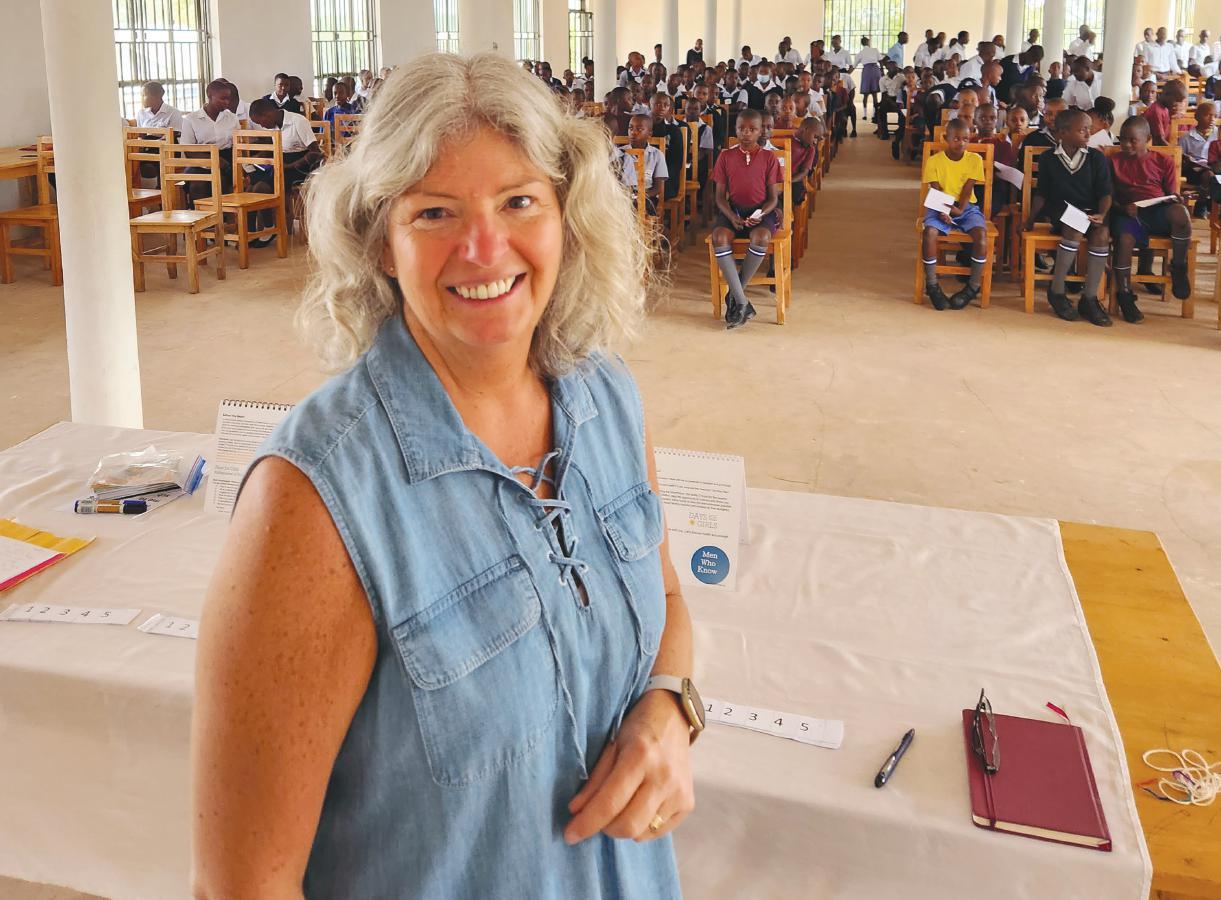
Most women and girls use homemade alternatives to manage their menstruation.
Typically, girls use materials including pieces of mattress, banana leaves, cardboard, tree trunks; other girls dig holes in the ground to collect their blood while others use herbs to reduce blood flow.
These methods are ineffective, uncomfortable and can lead to infection. By providing Dignity Kits, the girls can stay in school — they are given their days back!
After our presentation the girls and women authored “thank you” postcards to our sewing team back home. I also received thank you letters from the students and one comment in particular stood out: “Now I know why God made me a girl.”
To God be the Glory!
10 The Saskatchewan Anglican May 2023
Kathy Hawkins speaks to girls from the Bishop McAllister College in Uganda about female hygiene dignity kits, during a recent trip to the African country.
Photos by Bishop Michael Hawkins
School girls inspect their new flannelette absorbent liners and dignity kits.
$18.31 per kit x 400 = $7,324 work hours = 8 hours per kit x 400 = 3,200 work hours
Teaching sex ed to young men challenges bishop
By Bishop Michael Hawkins
PRINCE ALBERT — Dear friends, I have never been so thankful and privileged to serve with you as your bishop as I shared your generosity, compassion, and sense of justice with the girls and women of Bishop

McAllister College and Seminary Kyocera, Uganda.
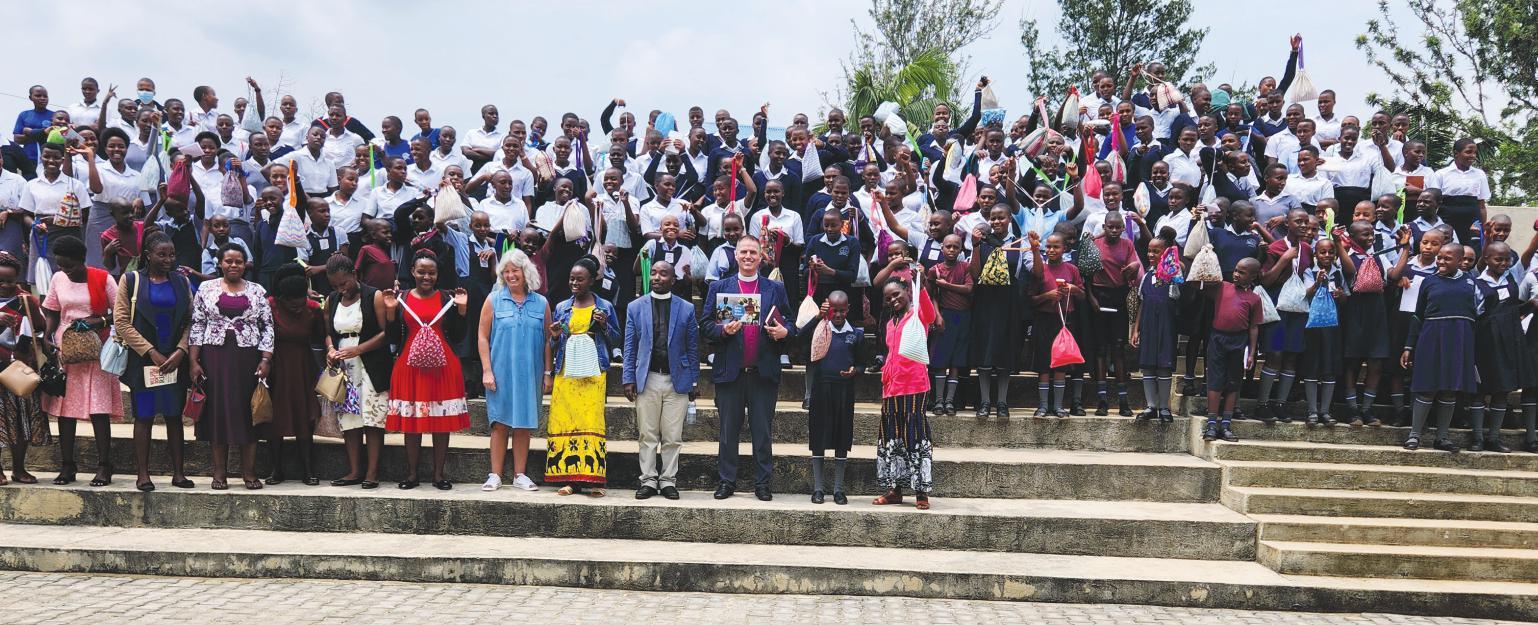
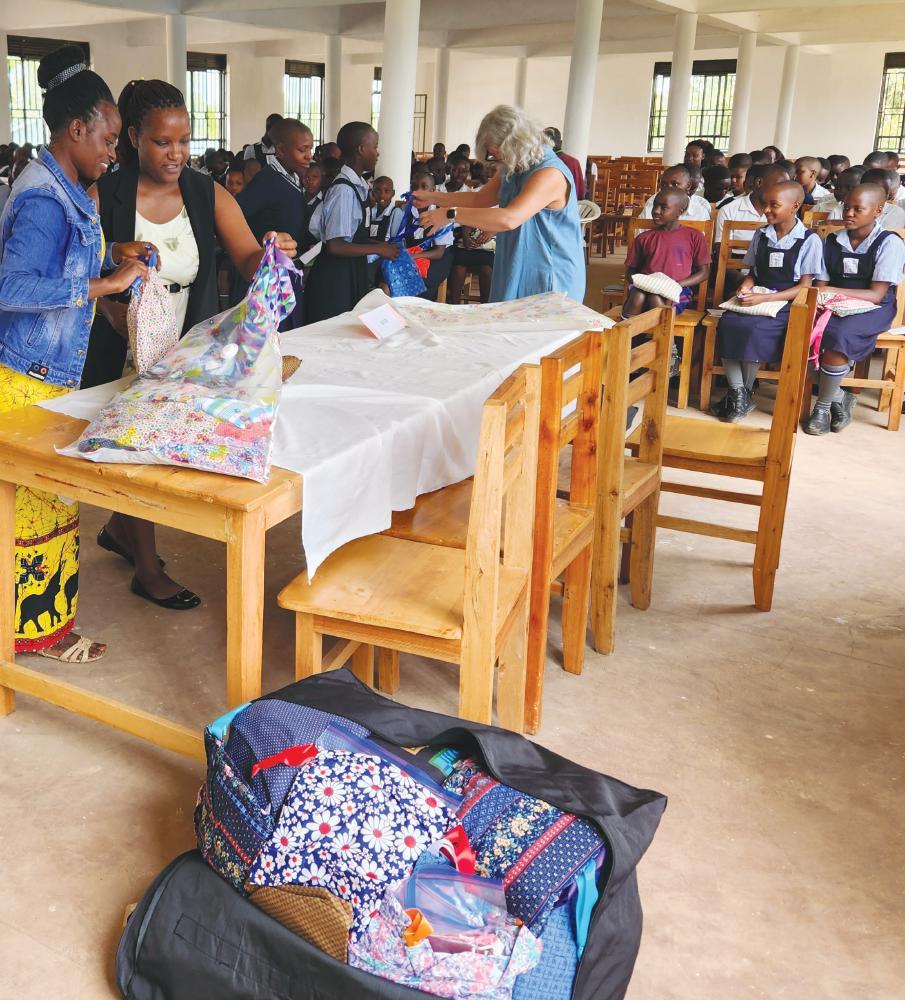
Kathy and I spoke to the general assembly about the dignity, health and honour of our bodies and introduced the particular day's subject by reading Luke 8:40-56 to over 500 pupils.
We then split up and I
spent time on general sex education, menstruation, consent and human trafficking with the boys, while Kathy did the same with the girls including explaining and handing out the use and care of the dignity kits.
Teaching sex education to 250 boys aged 11-17 was one of the hardest
challenges of my life but they were respectful and receptive.
We became “men who know,” who understand menstruation, respect its natural and life-giving role in creation, human society and in all girls and women.
We were pleased to be able to attend worship
three times and to be warmly welcomed and to extend your greetings.
It was a delight to see all the improvements in the school including a new music building and a library that became a memorial to my late godson Eric Bright.
Thank you for all your generous support.
May 2023 The Saskatchewan Anglican 11
The Hawkins' kitchen table is full of materials used to build the Dignity Kits for Uganda girls.
Photos by Bishop Michael Hawkins
Mothers of students at Bishop McAllister College inspect some of the female hygiene kits while Kathy Hawkins (middle, in blue) distributes packages to students.
Kathy and Bishop Michael Hawkins (centre) pose with the 500 students at Bishop McAllister College in Uganda.
... Residential school survivors to receive 16
Continued from page 1 supplies and completed quilts arriving almost immediately.
The project, initially housed in her living room in Timmins, Ont., grew into a not-for-profit organization operating from a fully-equipped donated studio.
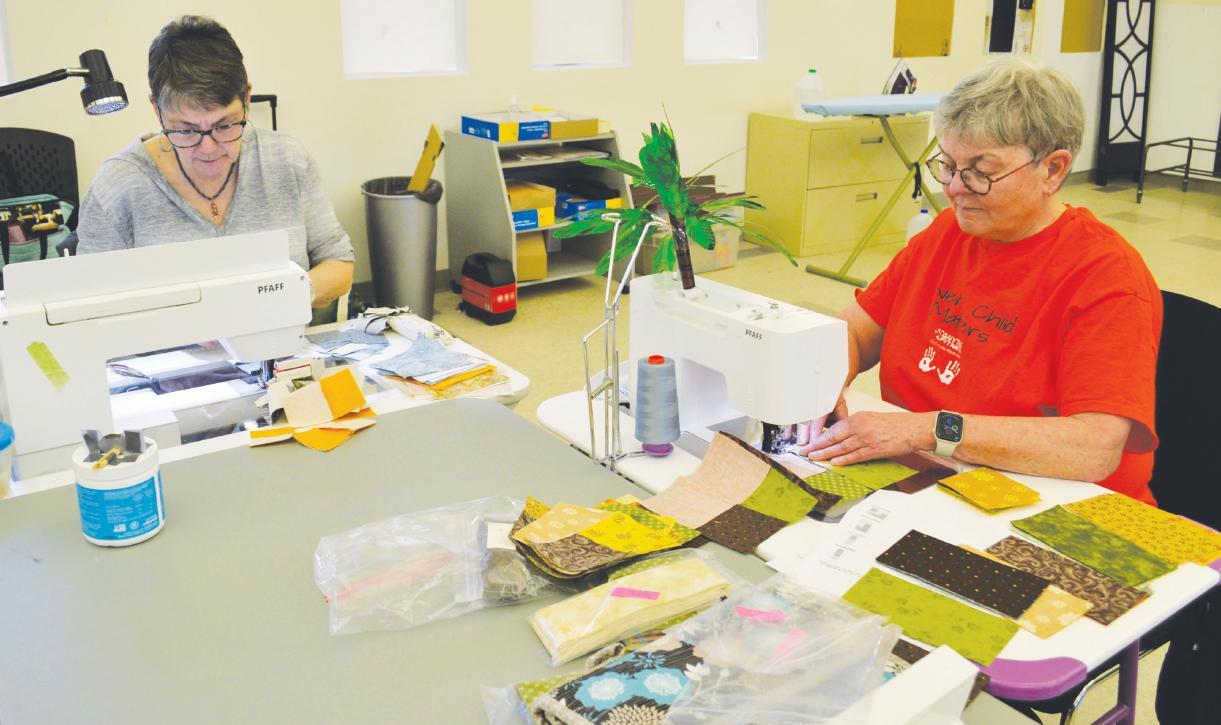
To date, more than 2,700 quilts have been sent to survivors all across Canada. (For more information on the organization go to www. quiltsforsurvivors.ca).
Berger says when she “stumbled across Vanessa’s Facebook page” in early July 2021, she felt the overwhelming desire to help.
She “asked a few of my quilty friends to participate” and they were able to send a dozen quilts to Saskatchewan survivors by January 2022.
She says the past year has been a journey of education and understanding.
Although she grew up in Prince Albert when a residential school was operating there, she knew nothing about that school and all the others across Canada. She says she “lived (her) life in ignorance as to what had happened in these places.”
Now Berger has had opportunities to talk with survivors and learn from them.
She says, “Indifference to something that doesn’t directly affect me doesn’t help or solve the problem.”
She has also participated in a smudging ceremony and learned about this important tradition.
She hopes that the completed quilts can be smudged before they are given to survivors.
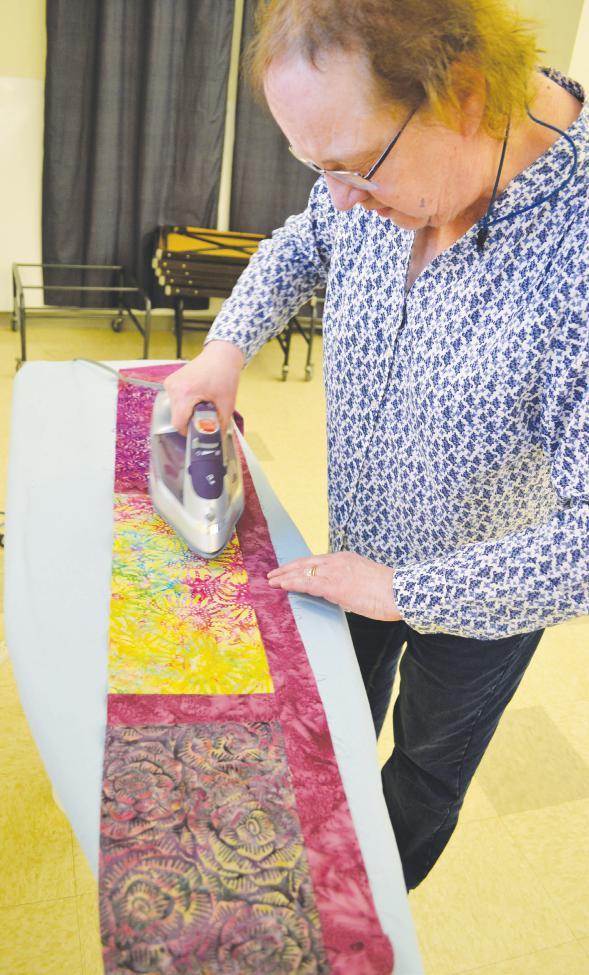
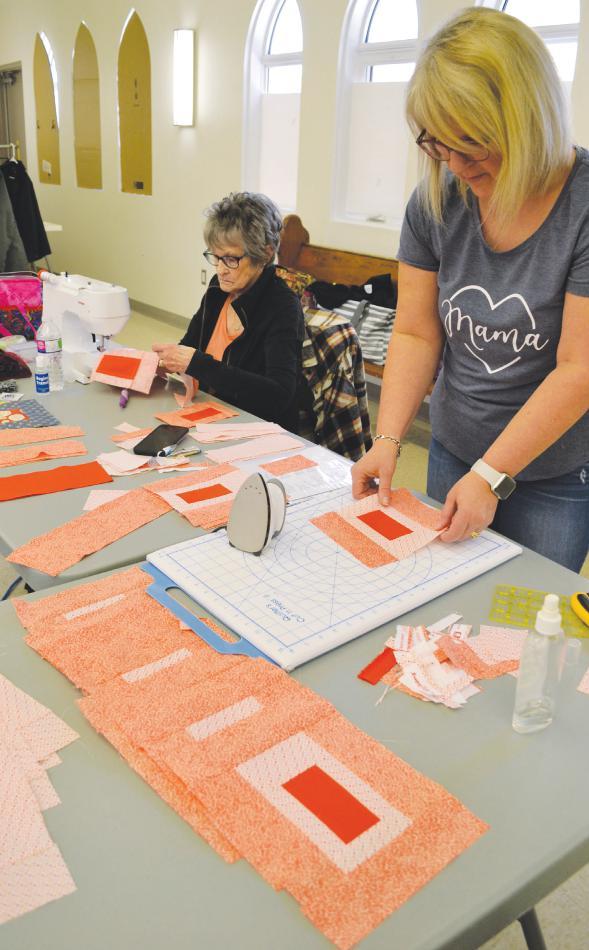
12 The Saskatchewan Anglican May 2023
Renee Boomer and Jymmi Kaye Demchok stitch pieces into blocks. All photos by Joanne Shurvin-Martin
Robin Bells (standing) and her mother Nicola Goldade assemble and iron orange blocks. Most of the quilts incorporated some orange colours to honour survivors.
Marilyn Andrews, a member of St. Paul’s Cathedral, presses a quilt strip.
quilts created during modern quilting bee
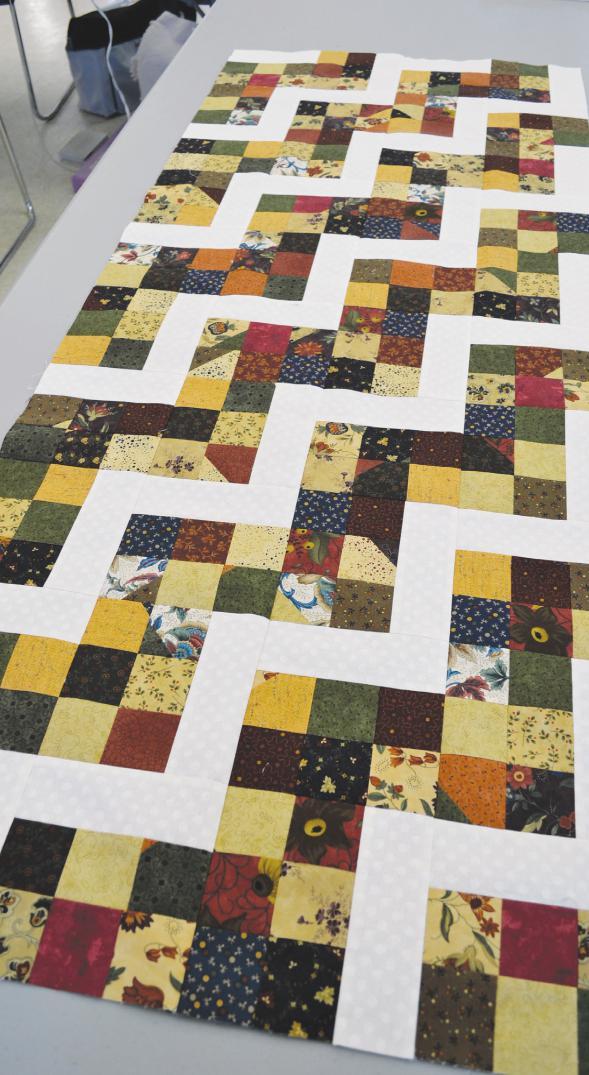


May 2023 The Saskatchewan Anglican 13 16
One of the finished quilts on display at St. Paul’s Cathedral for the Prairie Piecemakers Quilters’ Guild Sew and Go event. Photos by Joanne ShurvinMartin
Finished blocks from various quilters are pinned up to arrange before being stitched together.
Finished blocks are joined together to make a quilt top, then batting and a back are added, and finally all the layers are stitched together.
Feeling the Holy Spirit
It's Eastertide. Christ is risen! Alleluia!!
By Rev. Gene Packwood

Jesus is alive and present with us now in the Scriptures, in His Church and all through the Holy Spirit, our Helper, who guides us into all the truth, glorifies Jesus and abides within us keeping us warm and malleable.
I’m a bit of a lectionary nerd. I particularly like the way Anglican lectionary not only takes us through the Bible systematically (most of it every year, the New Testament twice, and the Psalms every month in The Book of Common Prayer (BCP), and about every two years in The Book of Alternative Services).

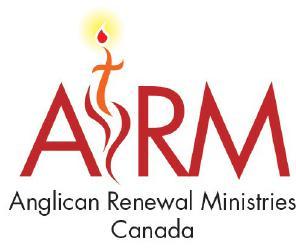
The BCP though, has some special seasonal nuggets hidden away in its daily office lectionary:
• from Christmas Eve through to The Innocents’ Day on Dec. 28 each year (pp. xviiixix)
• through Holy Week, Easter Day and the week after (pp. xxvixxvii)
• and Whitsunday, or Pentecost, and the week and Ember Days after that (pp. xxxxxxi)
In each case, the lectionary interrupts the regular systematic Bible readings with ones that pertain to the season at hand.
They are brilliant choices for growing in faith, understanding and discipleship.
Since Pentecost will soon be upon us (May 28), I’ll focus on the rich fare provided for Whitsunday and the week after, shown in the photograph.
What we have here is a remarkable list of readings — from Joel 2 and God’s promise to pour out His Spirit on all flesh (v28) on the morning of Pentecost Sunday, to 2 Tim. 1 and guarding the good treasure entrusted to us in Evening Prayer on the following Saturday, the Eve of Trinity Sunday.
What it amounts to is an excellent and thorough Biblical Life in the Spirit syllabus! These 28 beautifully relevant and
helpful readings are well worth some prayerful reading, marking, learning and inwardly digesting.
Do them in seven days as laid out in the lectionary, or, if that’s too much, 14 or 28 days—or even weeks! By yourself or with friends.
Here are 12 key Holy Spirit principles arising out of verses from those readings to keep in mind as you work through them.
The Holy Spirit…
1. Dwells in us (Rom.
8:9, 1 Cor. 3:16)
2. Is the Spirit of wisdom, understanding,
counsel, might, knowledge and the fear of the Lord (Isa. 11:2)
3. Helps us in our weakness and our prayers (Rom. 8:26)
4. Replaces hearts of stone with hearts of flesh (Ez. 11:19)
5. Is the Father’s promise to us and for our children (Acts 2:33, 39)
6. Is intelligent, holy, unique, manifold, subtle, mobile, clear, unpolluted, distinct, invulnerable, loving the good, keen, a breath of the power of God, a pure emanation of the glory of the Almighty, reaches mightily from one end of the Earth to the other, and orders all things well (Wisdom 7:22 to 8:1)
The BCP though, has some special seasonal nuggets hidden away in its daily office lectionary. In each case, the lectionary interrupts the regular systematic Bible readings with ones that pertain to the season at hand. They are brilliant choices for growing in faith, understanding and discipleship.
7. Is a gift, not like wages to be earned (Acts 2:38)
8. Can noisily rattle our bones or come with the sound of sheer silence (Ez. 37:7, 1 Kg. 19:12)
9. Enables us to understand the gifts God gives (1 Cor. 2:12)
10. Also provides the kind of skill, intelligence and knowledge in every kind of craft, to devise artistic designs (Ex. 35:3132).
11. Is to live by (Gal. 5.16:17)
12. Is not a spirit of cowardice, but rather a spirit of power, love and selfdiscipline (2 Tim. 1:7)
Above all remember, “To each is given the manifestation of the Spirit for the common good” (1 Cor. 12:7). That includes you and me. No exceptions. So, as Paul wrote, “strive for the greater gifts” and “remember the still more excellent way” (1 Cor. 12:31).
This set of readings and the Life in the Spirit syllabus they provide is an excellent resource for Whitsuntide.
14 The Saskatchewan Anglican May 2023
The lectionary in the Book of Common Prayer.
Photo courtesy Rev. Gene Packwood
Equipping the saints for the work of ministry
Ministry courses are now offered through The Western Educational Collaborative Anglican Network, also known as W.E.C.A.N.
By Rev. Dr. Trish McCarthy
Dear friends, the goal of our Saskatoon School of Discipleship is to educate and empower lay people for an enhanced ministry, either continuing as a lay person or in the prospect of an ordained ministry.
All Anglicans are welcome to take any of the listed courses for their own spiritual enrichment or for a future formalized ministry.
Our School of
Submitted
SASKATOON — The Diocese of Saskatoon’s School of Discipleship “Ministry Preparation” Program is a part-time three-year Licentiate.
Students may begin courses part-way through the threeyear cycle unless prerequisites are stated.
People wishing to take a course should consult with the co-ordinator.
People who sense a call to diaconal or priestly ordination will go through the diocesan discernment process ideally before the midway point of the individual’s program.
TO REGISTER, send this info to tmccarthy@ sasktel.net including:
REGISTRATION in the subject line, name and course dates, your name, address, email, phone number, parish name and town or city. If you have questions, contact Rev. Dr. Trish McCarthy by email or 306-370-8378 , or snail mail c/o School of Discipleship: 1403–9 th Ave. N. Saskatoon, S7K 2Z6.
Ethics I and II
ZOOM and in-person
Friday, May 13, 7 – 9 p.m. & Saturday, May 14, 9 a.m. – 5 p.m.
Discipleship’s Ministry Preparation program has begun for a new group of students.
However, students are welcome to join in partway through, unless a specific course has a prerequisite.
We are collaborating with western and northern Anglican diocesan schools for ministry offering a rich and diverse program that can be taken online or in person.
We are all in this together and we learn together!
Emmanuel and St. Chad College oversees and grants the Licentiate in Theology to students registered through their diocese.
To register for a specific course, contact
the ministry school coordinator Rev. Dr Trish McCarthy listed for that course and please notify your own School of Discipleship about it as well.
Upcoming program
Course: Indigenous Learning and Awareness Series
School: QSMM, in progress
Course: Dr. Leta Kingfisher, Tues., May 16, 7 to 9 p.m., Early Anglican Indigenous Ministries and Involvement in the Church Course Dr. Leta Kingfisher, Tues. June 6, 7 to 9 p.m., Indigenous Spirituality
Delivery: Online only
Register: qsmm@ quappelle.anglican.ca or Archdeacon Catherine Harper at archdeacon. catherine@sasktel.net / (306) 522 – 1608
Please Note: A new New Testament Course is being planned and will be announced when information is available.
The following course is designed for clergy who have been ordained five years or more.
Course: The Ministry of Supervision I and II (ESC – PE 351)
School: For clergy who have been ordained five years or more
Co-ordinator: Rev. Dr. Trish McCarthy
Instructors: Dr. Adam Wright, Dr.
Brian Chartier, Bishop David Greenwood, Rev. Dr. Iain Luke, Dr. Becca Whitla, Rev. Dr. Catherine Harper, Dr. Daranne Harris and Rev. Dr. Trish McCarthy
Date: Module One, Monday, May 15 to Friday, May 19, 2023 9 a.m. to 3:30 p.m. (5 days)
Module Two, Monday, June 5 to Wednesday, June 7, 2023 9 a.m. to 3:30 p.m. (3 days)
Time Zone: CST
Delivery: Hybrid using an STU tech classroom
Contact: Lisa McInnis at esc.registrar@ saskatoon theologicalunion.ca or call 306-975 – 3753
Cost: $500 per participant to be shared between the diocese, parish and clergy person.

May 2023 The Saskatchewan Anglican 15
'Like living stones ... let yourselves be built into a spiritual house' (1 Peter 2:5)
Ministry prep classes ongoing
Safe Church Workshops Spring 2023
Workshop #2: “Preventing & Responding to Abuse”
On ZOOM only
Part B: Tuesday, May 3, 6:30 to 9 p.m.
Contact: Rev. Dr. Trish McCarthy saskatoonschoolofdiscipleship@gmail.com (306) 370 - 8378
Please note that: All Diocese of Saskatoon Clergy and Church Wardens are to take Safe Church Workshops 1 and 2 by May 30, 2023

Instructions:
Please Register: 1 week before the first of the two-part classes by sending Rev. Trish McCarthy your registration with: Name, Parish, Locale, Phone Number and Email address
Workshop #2 Builds Upon Workshop #1: Pls. start with Workshop #1
Join ZOOM Meeting: https://us06web.zoom.us/j/87505848232
Meeting ID: 875 0584 8232
Passcode: 182169
Ministry of Supervision Course
Hosted with the Saskatoon Theological Union
Mon. to Thurs , May 15-18, 2023 and Mon to Thurs , June 5-8, 2023 9:00am- 12:00pm, 1:00-3:30 p.m. Hybrid Delivery: in person and on ZOOM
This course is designed for those who have been in the ordained ministry for five years or more with interest in passing on their wisdom and insights to those beginning ministry
Cost: $500 in total per person for the two four-day modules
Facilitators: Dr. Becca Whitla, Rev. Dr. Iain Luke, Bishop David Greenwood, Dr. Brian Chartier, Ven. Dr. Catherine Harper, Rev. Dr. Trish McCarthy & Dr. Adam Wright
Journey Spiritually and Theologically with Supervisee: Share Constructive Feedback, Adopt Intercultural Ministry Patterns, Encourage Self-Care in Ministry, Support in Sermon Development, Support Ministry Learning Goals
Adopt More Tools in: Supervision, Leadership Development, Organizational Systems, Group Dynamics, Management of Conflict and Nurturing Healthy Congregations in Supporting those New to Ministry
Course Delivery:
2 four-day modules, three weeks apart with reading and assignments in between. Course could interest experienced clergy in advanced studies.
Registration:
Emmanuel and St. Chad Seminary Registrar: (306) 975 – 3753 / esc.registrar@saskatoontheologicalunion.ca
Stewards of God's abundance
Compounding generosity
By Christine Burton
Render unto Caesar what is Caesar’s. We’re still doing it 2,000 years later, but now Caesar is known as Revenue Canada! While we all appreciate the many blessings we receive in the form of services from our governments, whether Medicare, public education, roads, swimming pools, libraries, or a host of other things we take for granted and grumble about, it’s still a universal pastime to look for ways to reduce our taxes payable.
I hope you took full advantage of your charitable donation deductions by using the end of year tax opportunity to make a special Christmas donation to your church.
A big thumbs up if you did! Sad noise if you missed that chance.
I know, you want to give, but Christmas can be a tough time of year, what with gift-giving and other year-end expenses. Where can you find the money? Well, the month of May can be a second chance, thanks to those taxes you just paid. Really!

You already know that donations to your parish or diocese are tax deductible. Just make that donation a little earlier, using your refund.
It reduces the financial stress on you at Christmas and year-end, and helps your church get through the summer months when people sometimes forget to give while they’re away on summer vacation.
Many of us, when we get refunds, drop them straight into our bank accounts where it gets nibbled away at, just part of our usual spending, disappearing with little to show, like the last of the snowbanks.
And every year we tell ourselves, “This year I’m going to put that refund into something meaningful!”
Well, make this year the year — give something to your church. You can even talk to your priest
or vestry to identify a particular need to which you could contribute.
Others put their refunds into investments or funds for things like trips or new bikes or a good time with family and friends — what could be better?
Well, nothing could be more of an investment than paying and praying it forward to God through a donation. Research has definitively shown that healthy churches are a key part of healthy and happy communities, reducing social needs and associated costs — maybe leading to tax reductions in your municipality?
It’s more likely to happen with prayer and a donation than with just complaining about taxes.
More importantly, you’ll set a great example to your kids, showing them faith and gratitude are expressed by generosity and commitment, not just at Christmas, but also at tax time.
But what about your plans or needs? You don’t have to give it all to the church, although I’m sure your vestry would be happy to receive it!
Taking even a share of your refund and donating to your parish or to one of our dioceses’ many meaningful activities, such as our Indigenous Ministry or Camp Harding, will not only make a difference in our parishes and faith community, but will be of direct benefit to YOU, next year, when you do your taxes again — and have a great deduction to claim!
If you want, you can make it even easier by arranging auto-debit. You probably won’t even notice a few extra dollars less each month, but next spring when doing taxes, you’ll be glad you did!
That deduction also means you have an even better refund next May, and can do it all over again.
It’s time to take Jesus’ advice — render unto Caesar what is his. But let’s give some more to God, and see how Caesar’s share goes down and our blessings go up!
16 The Saskatchewan Anglican May 2023
Students lead service to celebrate feast of St. Chad
On March 2 at All Saints’ Anglican Parish, Saskatoon, a Eucharist Service was conducted by the students of the College of Emmanuel and St. Chad for the public and students from the Saskatoon Theological Union to celebrate the Feast of St. Chad. Pictured (from left) are Rev. Dr. Trish McCarthy, the Venerable Alex Parsons, Judy Neiman (sub-deacon for the service), the Rev. Dr. Iain Luke, principal of the College of Emmanuel and St. Chad, the Rev. Alexa Wallace (deacon for the service), Rob Maguire and Ryan Strong.
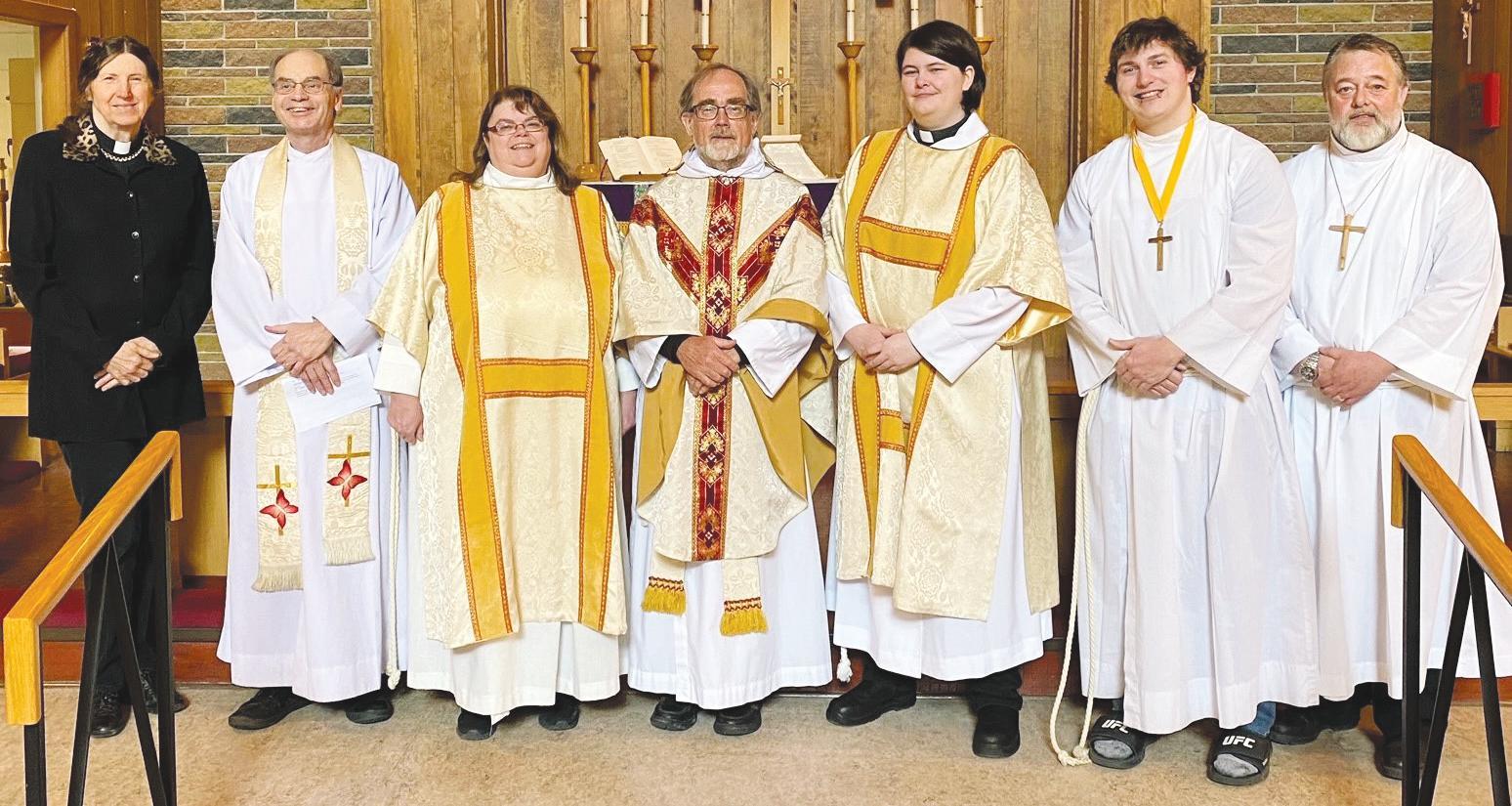
Is clergy support an enigma?
By the Rev. MarieLouise Ternier
By the time these words are printed the newsfeed on Facebook has rolled merrily along.
But back in mid-March a tragic death occurred of the Rev. Anna Matthews, a beloved parish priest from St. Bene’t Parish in Cambridge, UK, where she had ministered for 11 years. Anna took her own life.
An ocean away, the news of her shocking death prompted an Episcopal priest, The Rev. Mike Rayson, to share a poignant reflection (Facebook posting March 16) about the suffering and challenges of ordained ministers; a suffering that often remains hidden, unacknowledged, and unattended to because of the nature of our vocation.
Revealing as it was, Mike’s Facebook post hit a nerve with countless clergy who shared his post on social media. It is sobering when a colleague (known or unknown) determines that taking his/her own life is the best alternative.
When that happens, alarm bells shriek, and we had better pay attention.
Of course, many people struggle in their jobs. Just imagine the struggles and stresses borne by those who work in health care, in education, in social work. Relentless stress
A friend helping another friend in need.
week after week, often with few positive results.
But is there a difference for clergy?
My Lutheran colleague Rev. Bruce Ehlert thinks so: “I think a major part of our struggles as clergy is that to honour our call and be truly effective as spiritual leaders, we have to make ourselves vulnerable. I don’t think people realize just how much we are putting

ourselves out there when we preach, counsel, and advise.”
Last year I shared on these pages about a supportive friendship I enjoyed with an Anglican colleague who lived in the same community. I truly miss him.
I continue to wonder why clergy find it hard to turn to one another for mutual support and solace. Apart from the valid
Photo courtesy SHVETS production/Pexels.com
points raised in Mike Rayson’s Facebook posting, introvert pastors seem to thrive better without visible support; some introverts were surprised to discover that the COVID isolation exposed limits to their solitary enjoyment.
City clergy remain blissfully unaware of the isolation rural colleagues experience. Overwhelming demands in ministry can
leave little energy and attention to foster healthy clergy friendships. Our theology/ spirituality of service, self-surrender, and sacrifice, while noble and praiseworthy, after the example of our Saviour Jesus Christ, who gave Himself unreservedly, can also play a risky role in ordained clergy.
I recall vividly how I
Continued on page 18
May 2023 The Saskatchewan Anglican 17
Photo by Ted Neiman
Assiniboia now worshipping with Lutherans as church deconsecrated
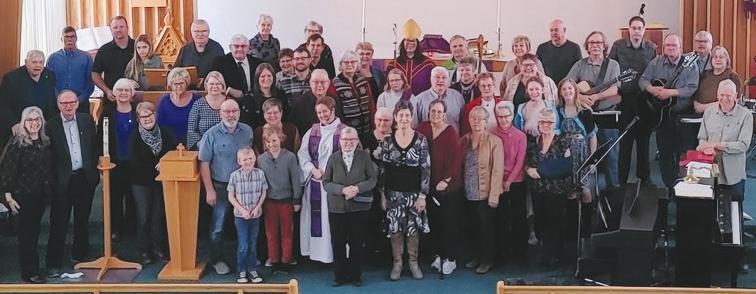
Submitted
ASSINIBOIA (Qu’A)
— On March 19, Bishop Helen Kennedy deconsecrated the building that had housed St. Boniface and St. Lawrence Anglican Church.
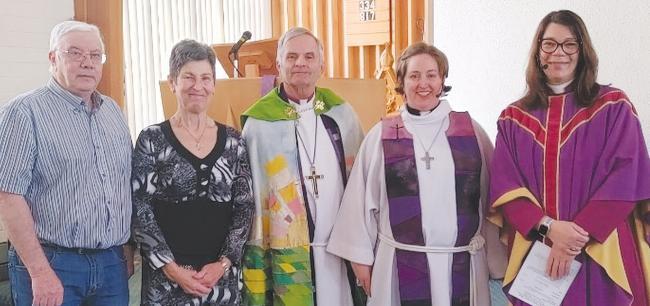
Immediately after the short service, the congregation drove to Messiah Lutheran Church where both Kennedy and Bishop Sid Haugen of the Evangelical Lutheran Church in Canada jointly celebrated the service, during which the Memorandum of Understanding between the Lutherans and the Diocese of Qu’Appelle was signed.
In typical Prairie fashion, everyone enjoyed a pot-luck lunch after the service.
The parish of St. Boniface and St. Lawrence began in 1908, and finished building their church in 1919.
Fast forward 101 years, and after exploring the feasibility of worshipping with the congregation of Messiah Lutheran the past two years, the
parish accepted an offer from a daycare to purchase their building.
The parish was disestablished on Nov. 20, 2022, and the service on March 19 formalized their relationship with the Lutheran parish.
The building will now serve the community as the home of Assiniboia’s newest daycare, and following renovations will be filled with the love, joy and laughter of God’s children.
...Helping clergy when they face struggles
Continued from page 17 fell prey to this mentality in the COVID-years in ways that were not healthy. With pandemic restrictions in place and changes happening weekly, I did not feel I could take extra time off.
I was deeply committed to seeing us through this health crisis together, a crisis that had caused such massive shifts in all aspects of ministry. As the “fearless leader,” I wanted to see us through the worst of it all, doing my best to provide worship stability, personal safety, and pastoral presence in whatever way possible.
I gave my best to the challenges with a generous heart, deep commitment, and pastoral integrity.
While hard and anxietyproducing, I knew this posture of radical selfgift in ministry to be an integral part of my priestly and pastoral vocation. Inadvertently, I began to exhibit all the signs of a
pending burnout and had to sound the alarm.
The Rev. Bruce Ehlert shares: “In the ELCIC, we’re encouraged to create a mutual ministry team, choosing people from our congregation who exhibit trustworthiness and commitment, who meet with the pastor on a regular basis.
"While one person did me and the team a favour by moving away, the team was invaluable in surviving the genetic grumpiness that was sadly characteristic of one of the parishes I served.”
Having been a lifelong recipient (and provider) of spiritual direction, I strongly advocate for every ordained minister has access to solid spiritual direction, even funded by the diocese if needed.
COVID-19 has generated plenty of online spiritual direction services, so geographical distance does shouldn't impede access to a spiritual mentor/friend.
Sometimes it is easier to find trusted support outside our own tradition. Many moons ago I met weekly with a group of pastors from various denominations to share preaching ideas. But we also shared private concerns and worries, which was very helpful.
However, the success of this type of clergy support depends heavily on the personalities and ecclesial visions of the individual ministers.
I have also served in communities where pastors chose to minister in isolation from one another, inadvertently blocking the flow of mutual support that could benefit them all.
To the people of God, I say: be mindful that your pastor wears many hats and often juggles complicated interpersonal dynamics in your community of faith.
The challenges in your minister’s personal
life are often a quiet burden, rarely shared with parishioners for professional reasons.
Know that the pandemic required way more than any seminary training prepared your priest for, and some of us are still reeling from the experience.
The decline in Christian membership and participation makes ministry ever more challenging, tempting us to cave to despair and depression.
Lastly, it is not the pastor’s job to do the work of Christian ministry and service that is yours by baptism. To take a line from Mike Rayson’s Facebook post: “The culture of ‘we pay our pastor to do that’ should never enter your mind or pass your lips (or occupy your ears) ever. E.V.E.R!
"A minister is a colabourer with you in Christ — not the paid representative to do the
work of evangelism, hospitality and generosity for you.
The idea that you can pay your pastor to do the work that you are commanded in Scripture to do isn’t just wrong, it’s bordering on heresy.”
Finally, to my colleagues, let us pray for each other, grateful to be partners in the Lord’s vineyard, not competitors. Take every chance to team up in ministry projects; there are extra blessings in joining forces, not to speak of the power of joint witness in the community.
Next time you meet a colleague, show genuine care and interest in their well-being.
Initiate that email, text or phone call, ask “how are you?”
Who knows, you might just be the ears they need to share a worry, a stress, or a joy and an achievement. We are human, and we need each other.
18 The Saskatchewan Anglican May 2023
Members of the former St. Boniface and St. Lawrence Anglican Church gather with members of Messiah Lutheran Church in Assiniboia after a service on March 19. With the Anglican church there now closed, the remaining Anglicans are worshipping with the Lutherans.
Photos courtesy Deacon Arleen Champion
Those who signed the memorandum of understanding were, from left, Ken Hamilton Lynn Sangster from St. Boniface and St. Lawrence, ELCIC Bishop Syd Haugen, Pastor Sarah Mowat and Anglican Bishop Helen Kennedy
Using vision and making planning a habit
By the Rev. Dr. Iain Luke Principal, College of Emmanuel & St. Chad
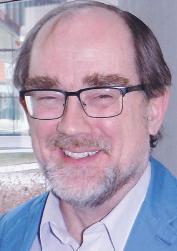
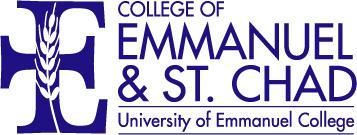

Some time ago, I attended a diocesan clergy conference where an evangelical pastor spoke to us about long-term planning. He invited us to think about the vision our parishes had for the next five years, and the next 25.
Gulp. I often go back to that moment to remind myself of two things. One, the Anglican churches I know generally don’t think about the future as much as we should. And two, there are reasons why we don’t.
In my role as college principal, though, I have to pay attention to where we are going, what the future might hold, and how we prepare to meet the challenges and opportunities coming towards us.

So, I want to take a closer look at our experience, at Emmanuel & St Chad and in parishes across the province, when it comes to planning.
Maybe our first obstacle is the feeling that planning contradicts our identity as faith-based communities. The future is in God’s hands, not ours, and the best way to make God laugh is to “tell Him your plans.”
There is some truth there, and certainly any planning the church does must be rooted in humility and discernment, listening to God, rather than our own dreams and ambitions.
Even so, faith equips us with ways to think about the future, to see what
is coming and respond to it, in keeping with our call from God to share good news as we love and serve our neighbours.
PWRDF, as an example, came into being based on the idea that we can foresee the need to respond to disasters, even before they happen.
With godly generosity and prudence, we can gather up resources that are ready and waiting, whenever help is needed.
On a more local scale, we are all deeply involved in the communities where we live. We can see needs as they emerge and begin to dream about how to share God’s love in the midst of those needs. The needs might be spiritual, social, or intensely practical.
One church might see a new housing development as an opportunity, and a call to re-focus its energies or even its location.
Another church might see that its neighbourhood is aging, and plan to expand its supports for seniors dealing with health issues, loneliness, or an increase in leisure time.
Yet another might identify increases in poverty, or the drug overdose epidemic, as a call to action and advocacy.







All of these developments are foreseeable, if we pay attention to trends in the present and how they project into the future.


My hunch is that most parishes would be excited and energized to look at the future and make a plan, to be a more effective
Continued on page
May 2023 The Saskatchewan Anglican 19 Find the resources you need to Grow in Faith • Amazing selection of books • Gifts for baptism, confirmation and more! • Devotional articles • Home decor • Candles including 100% beeswax • School and church resources 437 2nd Avenue North Saskatoon, SK S7K 2C1 Local 306.384.1924 Toll Free 1.888.316.8648 info@ucssask.com www.ucssask.com
20
Churches should plan for the future — with God's help
Continued from page 19 witness to God’s presence. So, why don’t we?
I can think of three reasons, though there may well be others. One is that we already feel stretched and underresourced, so we may not have the creative energy to look outside ourselves, or beyond our present challenges.
Yet, the witness of churches that have started down this path, is it offers people a sense of purpose and fulfilment, makes new connections, and builds confidence; not in ourselves, but in what God can do with us.
A second reason for reluctance is we may not feel we have the skills or expertise for meaningful planning.
How do we know what is really going on in our neighbourhood or community?
How do we convert our knowledge into action that makes sense for our church, and has an effect?
There are two key places to turn, if this is what is holding you back. One is the members of your church.
Many parishioners have professional and life experience that will help.
Farmers, teachers, business owners, government workers, and the whole range of church members have something to offer, when it comes to seeing what is happening around us and planning
how to be part of it.
There is another pool of resources in the community outside the church, often in unexpected places.
I know I learned a lot as a community participant in the public library’s review of its services.
Library staff shared information about the
community and its needs, which was directly helpful to the church I served as well.
The biggest obstacle of all, though, is our mindset. If we do not think of ourselves as people who look ahead, if we do not make planning a habit, we will be the “mighty tortoise” who is “always
treading where we’ve always trod.”
So, the first step, in any commitment to planning, is to change that mindset. That means prayer, for God to inspire our hearts and minds with care and passion for the future.
It means seeking out people who have the skills and the vocation to
D I O C E S E O F Q U ’ A P P E L L E
lead your community in seeking its vision.
It also means creating spaces where we can learn the habit of planning, by making it part of vestry’s job description, and by committing to even very small projects, which help us to learn how God is shaping a future for us to embrace.
Diocese received 94% of Fair Shares from parishes in 2022
By Jason G. Antonio
Diocesan council met on March 18 via Zoom and discussed several issues, including finances, fair shares, properties and the bishop’s latest activities.
Finances
While the Living the Mission campaign is over, some people have wondered whether the Sybil McNichol Mission Fund could be used to further support that campaign or even the diocese’s general operating account, Bishop Helen Kennedy said.
However, the diocese will not be using that
$100,500 for either of those purposes. Instead, the diocese will maintain that mission fund as its own account.
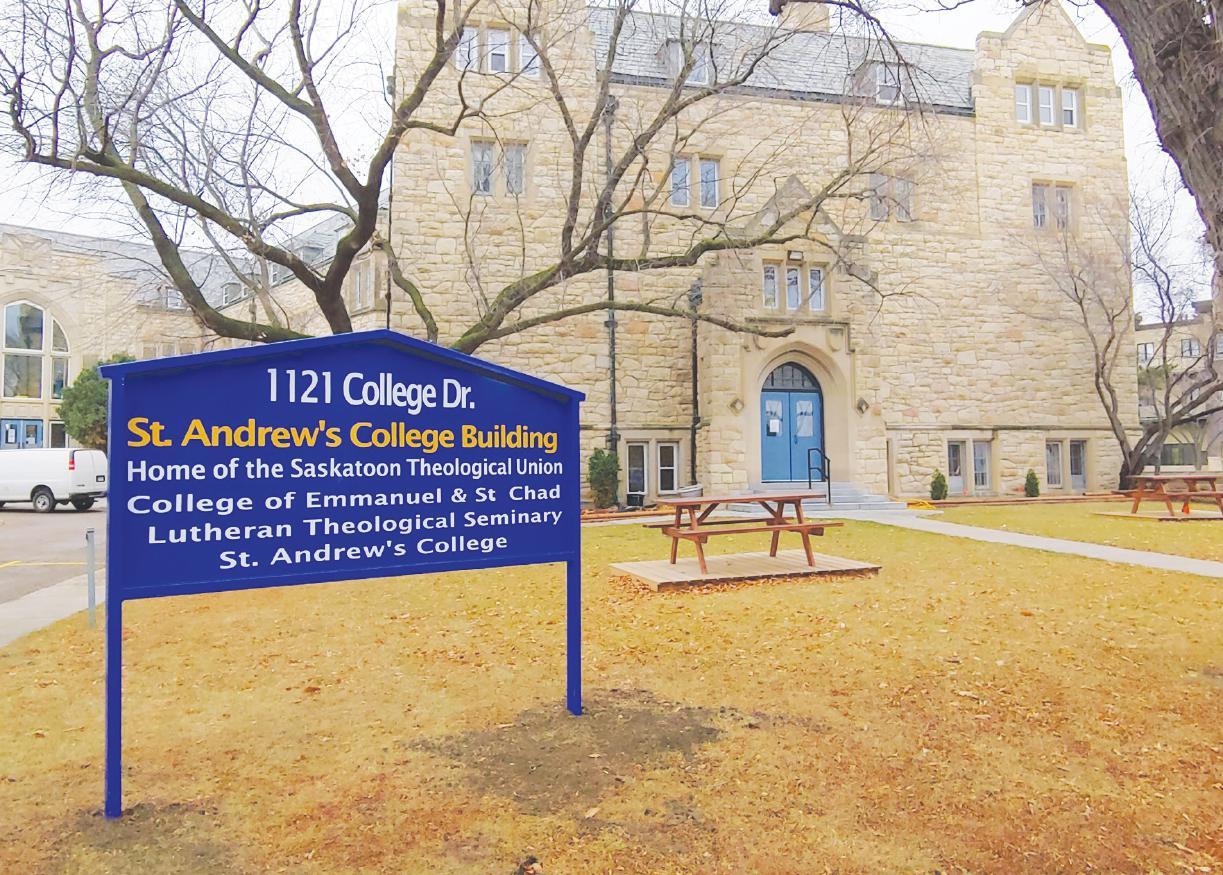
With last year’s budget, the diocese had expected $735,385 in total income and $910,422.25 in total expenses, with a projected deficit of $175,037.25. However, the actual numbers turned out to be, respectively, $837,534.25, $924,783.11 and minus-$87,248.86.
The deficit was less than expected because the diocese received more in resource revenues — oil and gas and potash — than expected. The diocese owns property in rural Saskatchewan and leases
some to resources companies, while it earns a small royalty from the production of those resources.
Meanwhile, the diocese received $1,614,592.80 in other income — sales from the St. Luke’s, Regina building — last year, which meant the total net income for 2022 was $1,527,343.94.

For 2023 the diocese has budgeted for a deficit of around $200,000.
Fair shares
The synod office had budgeted to receive $460,898.76 from the 31 parishes in 2022, and after last year ended, parishes
next
20 The Saskatchewan Anglican May 2023
...
St. Andrew's College Building, home of the Saskatoon Theological Union on the University of Saskatchewan campus. Photo courtesy Facebook
Canadian money. Photo courtesy Unsplash.com
Continued
page
Former St. Matthew's, Regina site to be redeveloped
By Jason G. Antonio
The synod office plans to spend up to $5,000 to conduct a phase 1 environmental survey of the former St. Matthew’s, Regina site as part of that property’s redevelopment process.
A rectory and the former church are the main buildings on that land, but the diocese plans to demolish both as it looks to create a possible community hub and mixed-use rental housing on the site.
The diocese would have had to renovate the basement of the rectory at 2161 Winnipeg Street if it decided to keep the home.
Regina city council gave its approval in February to remove the church’s heritage status and granted a demolition permit after Dean Mike Sinclair appeared several times before that body with that request.
However, city council inserted some caveats about preserving some of the artifacts and maintaining a heritage look to any new buildings at that location.
Diocesan council received a report about the use of the six lots on the Winnipeg Street property during its March 18 Zoom meeting.
The synod office had considered making the rectory liveable and the first stop for refugee families coming to Canada.
However, that
changed after Trinity Centre Foundation (TCF) — a Canadian organization that helps churches transform their properties to support their communities — contacted the diocese about repurposing the location.
The diocese is working to find a project developer, and when it finds one, it will have architects create a conceptual site plan and put together a proposal.
It would then enter into a full legal agreement with the developer and create a limited partnership between the two parties.
The developer would be the main partner while the diocese would be the limited partner since the latter’s contribution — two per cent — would be the land.
The developer may consider some of the diocese’s opinions for
the project, but doesn’t have to since it would be contributing 98 per cent to the project.
So far, Regina home builder Edward Archibald is the only person to show interest, after TCF reached out to him.
The synod office plans to remove some of the stained-glass windows from the church before it’s demolished, while it also plans to keep some of the
bricks for possible heritage purposes.
The diocese is currently holding in a trust fund over $44,000 from the former St. Matthew’s Church. That congregation had used that money to maintain the building.
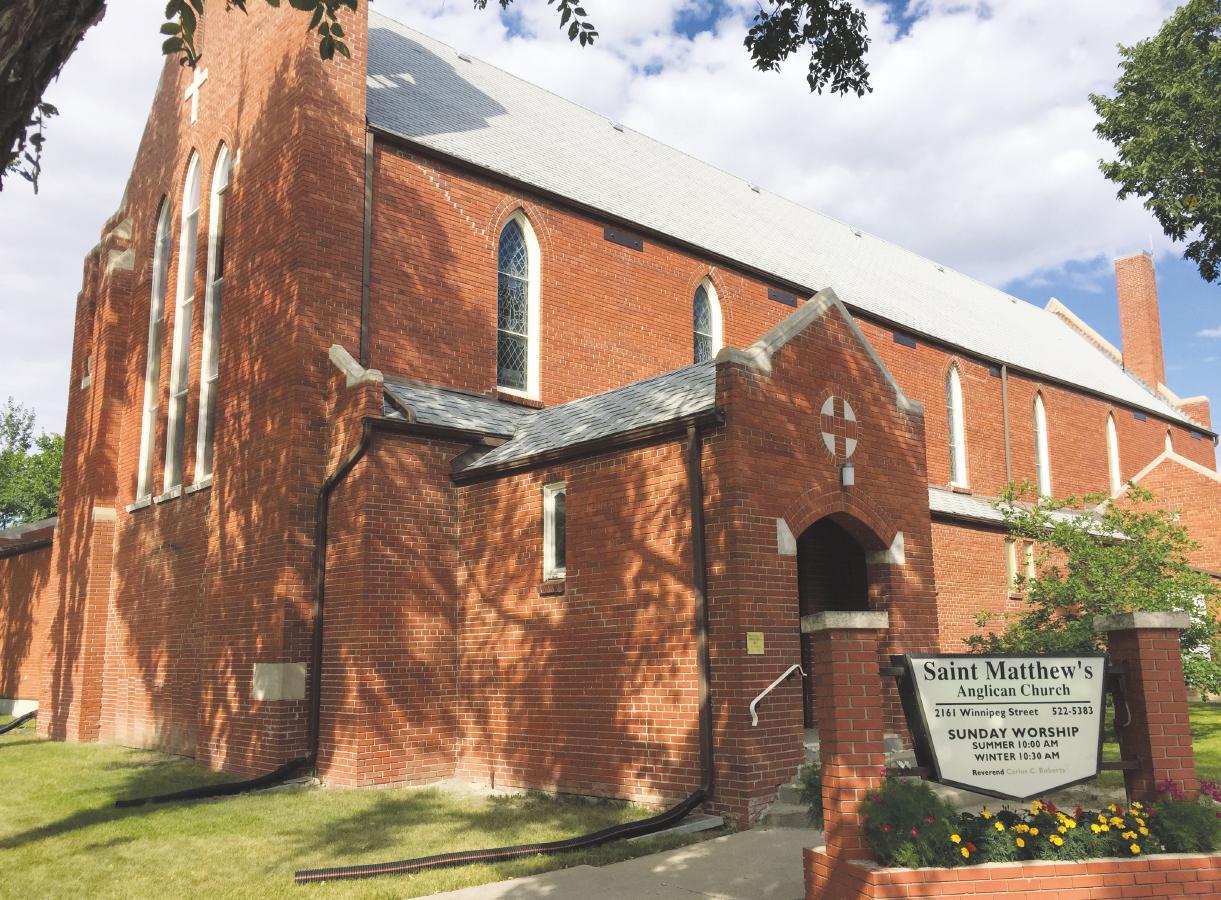
Once a developer is secured, Bishop Helen Kennedy plans to bring that proposal to diocesan council for discussion and approval.
... Bishop had busy schedule around diocese
Continued from page 20 sent in $436,800.65. This represents a 94.77 per cent submission rate, which is roughly what the diocese receives in fair shares annually.
Assiniboia church
The diocese sold the former St. Boniface and St. Lawrence Church building in Assiniboia to an area daycare for $35,000. The daycare is working on renovating the space so it can move in.
The church closed on Feb. 28 and handed over the keys and land title
to the daycare, said the bishop. The diocese held a service of de-consecration on March 19. The sale money is now in a trust fund to support the remaining Anglicans in that community.
As part of an agreement, an Anglican priest will lead a minimum of four Anglican services a year at Messiah Lutheran Church. However, there could be more if there is enough demand.
“Anglican services will continue in that place,” said Bishop Kennedy.
Bishop’s schedule
Bishop Kennedy provided an update on some of the activities she had attended between November and March.
The diocese hosted Quebec Bishop Bruce Myers as he presented about ecumenism at Luther College
The bishop met with Melville’s congregation to help it discern its direction
The diocese’s PWRDF reps are organizing and launching an informational event called “Grow Hope,” which will feature a meal and a
speaker from Kenya
Conversations are occurring with the provincial archivist to discuss the future of the diocese’s archival materials because the organization must find a new home for those items by the end of 2024
The bishop met with the chief and band council members of George Gordon First Nation to discuss the ongoing ministry of St. Luke’s Church; the diocese is also attempting to give back the church building and land but is facing federal
hurdles
Kate Berringer has been appointed the diocese’s safe church officer to help the organization ensure that Anglicans are safe in their relationships and buildings
The bishop has received most parishes’ decisions about whether they would host a same-sex marriage in their building. Since the diocese has no authorized liturgy for this type of marriage, she must always approve a special liturgy for the ceremony
The next diocesan council meeting is June 10.
May 2023 The Saskatchewan Anglican 21
D I O C E S E O F Q U ’ A P P E L L E
The former St. Matthew Anglican Church in Regina.
Photo contributed
St. Cuthbert Archdeaconry eliminated due to fewer parishes operating in Regina
By Jason G. Antonio
The Diocese of Qu’Appelle is eliminating one of its four archdeaconries because there are fewer parishes in Regina after five congregations combined into one during a major amalgamation.
A report about the reduction was presented during the March 18 diocesan council meeting.
For several years the diocese had four archdeaconries named after saints — Chad, Cuthbert, Columba and Aidan — and a senior priest who oversaw the parishes in that region.
In particular, the archdeacon and regional dean of the St. Cuthbert region had oversight of the Regina parishes and Plain and Valley in Lumsden, Kennel and Pense.
However, the creation of Immanuel Parish in Regina shifted the makeup of parishes in the Queen City. The archdeaconry went from having eight worshipping parishes — seven urban and one rural composed of three congregations — to having three city parishes and one rural parish.
This changed the map and made the St. Cuthbert deanery the smallest, while an archdeacon and regional dean were no longer required.
The diocesan canons allow for the boundaries to change, the council report said. St. Cuthbert’s could either go bigger and include more rural parishes, or cease to be and have a city parish connect with the rural parishes in the existing three archdeaconries.
During the meeting, Bishop Helen Kennedy explained she had plenty of consultation with clergy about what to do.
From those talks, she decided a city connection could be helpful to the rural parishes — and vice versa — which meant St. Cuthbert’s Archdeaconry is finished.
Therefore, Immanuel Parish is now attached to St. Columba Archdeaconry with Ven. Kim Sherwin as the region’s archdeacon. Further, Plain and Valley Parish is now connected to
St. Aidan Archdeaconry with Ven. Wilma Woods the archdeacon and Deacon Arleen Champion the regional dean.
Also, St. Mary the Virgin Parish is now connected to St. Chad, which does not yet have an archdeacon.
Meanwhile, St. Paul’s Cathedral is the home church of all diocesan members and does not need an archdeacon’s oversight. However, it would be helpful for the honorary clergy there to connect to colleagues elsewhere, so Dean Mike Sinclair will assign each assistant to an region.
The parishes in the St. Chad region include Eston, Coteau Hills, Midlakes, Swift Current, Palliser, Chinook, and St. Mary, Regina.

The parishes in the St. Columba region include Teachers of the Faith, Last Mountain, Raymore, Katepwa, Vernon, Qu’Appelle, Kamsack, Melville, New Sumner, Yorkton, and Immanuel, Reigna.
The parishes in the St. Aidan region include Weyburn, Estevan, Avonlea, Moose Jaw, Sask. Gateway, Whitewood, Oxbow (Cannington Manor) and Plain and Valley, Lumsden.
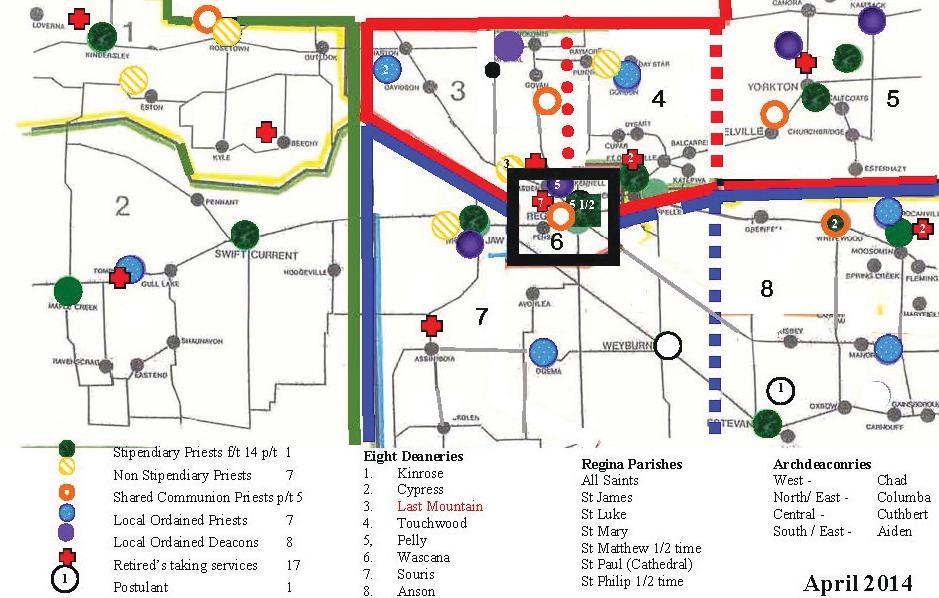
22 The Saskatchewan Anglican May 2023
D I O C E S E O F Q U ’ A P P E L L E
A map of the Diocese of Qu'Appelle, as of April 2014.
Photo courtesy Diocese of Qu'Appelle
Synod office staff prepare supper at homeless shelter
By Kate Berringer
YORKTON (Qu’A) —
As part of our Lenten focus this year, the Synod Office staff collected alms for donation to Bruno’s Place in Yorkton.
On March 27,
Bishop Helen Kennedy, Archdeacon Catherine Harper, Kate Berringer and Lucy Osime visited Bruno’s Place, a relatively new 10-bed homeless shelter in Yorkton.
We presented Lenten
alms from our staff, and with groceries we had purchased, spent a few hours preparing a meal of cheeseburger soup, cheese scones and selfsaucing chocolate cake. The intention with the Lenten focus initiative is


to inspire and encourage parishes to become intentional about the call to extra prayer, Scripture study, the collection of alms and fasting.
It is our hope that our Lenten focus has inspired parishes around the
Diocese of Qu’Appelle to an intentional focus on one or more of these elements.
It is our prayer that the Spirit be ever present in all of our worship, prayer and outreach this Lent and Eastertide.
Camp Okema now accepting registrations for this summer
By Jesse Holmes PRINCE ALBERT —
The board of directors with the Camp Okema Society for Christian Development is now accepting registrations from people young and old for this summer’s various camps and retreats.
The early bird deadline is Saturday, June 10, and after this date, the price will increase by $40. Please note, this rate does not apply to retreats or cabin leader training.
To register, visit campokema.com.
The retreats and camps this year include:
• June 2-4: Ladies’ retreat
• June 9-11: Men’s retreat
• July 8: Open House
• July 9-13: Cabin leader training, age
14 and up, $75
• July 16-21: Junior camp, ages 10 to 12, $305
• July 16-21: Canoe camp, age 13 and up, $350

• July 23-28: Junior teen, age 13 to 15, $305
• July 30 to Aug. 3: Small fry, ages 7 to 9, $260
• Aug. 5-8: Family camp, all ages
• Aug. 13-19: Teen camp, grades 9-12, $350
• Sept. 15-17: Young adults retreat, age 18 and up
Camp Okema is also hiring for five positions this summer: camp director, office administrator, maintenance coordinator, beach lifeguard and groundskeeper.
May 2023 The Saskatchewan Anglican 23
Diocesan Finance Officer Lucy Osime (l) and Archdeacon Catherine Harper prep vegetables in the kitchen of Bruno’s Place, a homeless shelter in Yorkton.
Photos by Kate Berringer
Bishop Helen Kennedy smiles for the camera while browning ground beef for a hearty cheeseburger soup, prepared for the clients of Bruno’s Place, Yorkton. The Synod Office staff selected the homeless shelter as the focus of their Lenten alms and service.
A youth retreat in 2022.
Photo courtesy Facebook
Youths enjoy fun Lenten retreat
Submitted
CHRISTOPHER LAKE
(Skwn) — Another successful youth retreat was held in the Diocese of Saskatchewan on March 10-12.
Fifteen youths and five leaders gathered at Christopher Lake for a Lenten youth retreat. They heard about Jesus’ fasting in the wilderness and their own journey towards Easter.
They spent a lot of time sledding, playing hide and seek, and singing karaoke together.

They are already looking forward to the next retreat, which will take place in June.

24 The Saskatchewan Anglican May 2023
Teens enjoy a ride down a snowhill.
Wipeout!
Photos by Rev. Brody Albers

 By Joanne ShurvinMartin, with files from Jacquie Berger
By Joanne ShurvinMartin, with files from Jacquie Berger













 By Mary Brown
By Mary Brown









 By Joanne Shurvin-Martin
By Joanne Shurvin-Martin
 By the Rev. Peter Coolen
By the Rev. Peter Coolen









































